The LG G5 is a television that not only continues but also enhances what we loved about the previous models in the G series. Instead of following the beaten path, LG opted for a new Tandem OLED panel – and it was a resounding success. Brightness? Simply, PH E N O M E N A L. HDR effect? Close to reference. Colours after calibration? Almost perfect. Motion fluidity, low latency, and features for gamers? At an absolutely top level. The G5 performs well both in films and games, day and night, with a decoder, console, PC, or even just the remote. Of course – it is not a product without flaws. It’s a shame there is no support for DTS, viewing angles have worsened compared to its predecessor, and the remote may vary depending on the version. However, when we look at the overall picture, it is hard not to feel that this is one of the best OLED televisions available on the market, and perhaps the best. Certainly, when it comes to its versatility and image quality without having to reach for the extremely expensive models of the competition. If you are looking for a television for everything – cinema, gaming, bright living rooms, watching online content or connecting a computer – the LG G5 is a device that simply delivers on every front without compromises.
- Matching (Score)
- Our verdict
- TV appearance
- Where to buy
- Contrast and black detail
- HDR effect quality
- Factory color reproduction
- Color reproduction after calibration
- Smoothness of tonal transitions
- Image scaling and smoothness of tonal transitions
- Blur and motion smoothness
- Console compatibility and gaming features
- Input lag
- Compatibility with PC
- Viewing angles
- Daytime performance
- Panel details
- TV features
- Apps
- Playing files from USB
- Sound
LG OLED G5 vs LG OLED C5
Direct comparison
Check the best price offer:
LG OLED C5G54 / G51 / G55 / LW / LS
C5 / C54 / C5ELB / C51
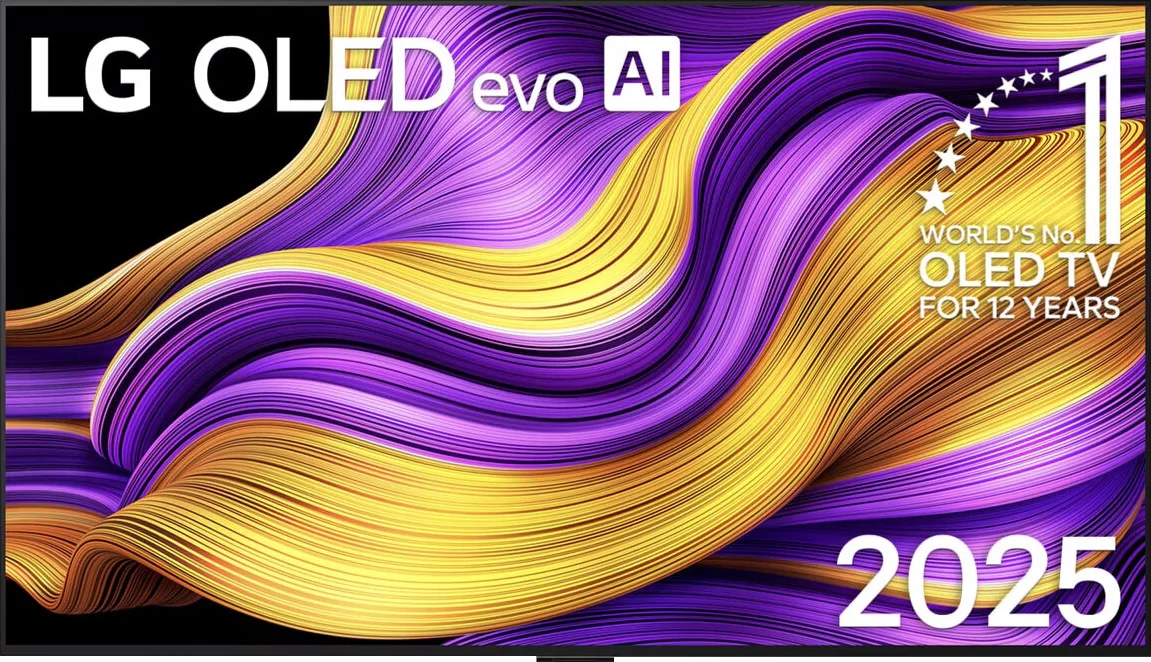
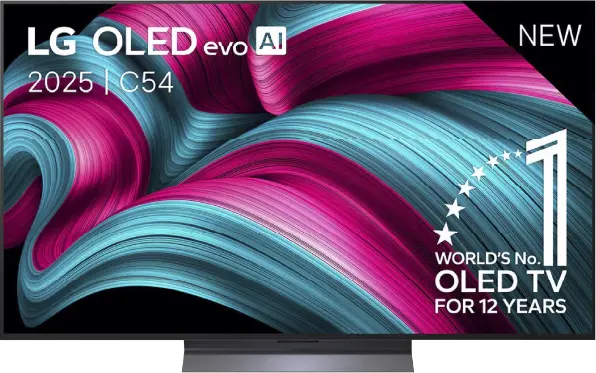
Panel type: WRGB OLED
Resolution: 3840x2160
System: WebOS
Model year: 2025
Complete the survey to find out the result

Panel type: WRGB OLED
Resolution: 3840x2160
System: WebOS
Model year: 2025
Complete the survey to find out the result

Overall rating
8.9
8.2
Movies and series in UHD quality
9.2
8.5
Classic TV, YouTube
9.2
8.9
Sports broadcasts (TV and apps)
8.8
8.6
Gaming on console
9.5
9.4
TV as a computer monitor
8.8
8.6
Watching in bright light
8.0
6.2
Utility functions
8.5
7.9
Apps
9.1
9.1
Sound quality
8.7
7.2
Complete the survey to find out what fits your preferences
Advantages
Amazing black and contrast
Reference colour reproduction after calibration
Very high brightness in HDR materials
Excellent collaboration with consoles and computers
Great motion smoothness - OLED panel 165Hz
Many features for gamers: VRR, ALLM, HGIG, low input lag
Great operating system WebOS with many applications
Superb control thanks to the Magic remote with "pointer" function
Excellent black levels and infinite contrast thanks to the OLED panel
Above-average brightness (for an OLED TV)
Nearly reference image quality after calibration
A full suite of features for gamers: 4xHDMI 2.1, low input lag, HGiG, VRR and more
Very good motion smoothness – 144 Hz OLED panel
Intuitive and modern WebOS system
Convenient Magic remote control with gyroscope
Disadvantages
No support for DTS audio format
Worse (though still good) viewing angles than its predecessor G4
Different versions of the remote in derivative models – it's hard to predict which version we will get
Different versions of the remote in derivative models – it's hard to predict which version we will get
Average reflection suppression – it can be distracting in very bright light
No support for DTS:X – an external amplifier is required for full compatibility with this format
Our verdict
LG C5 is a very successful continuation and, in some aspects, even a step forward compared to last year's model C4. The biggest change is the significantly higher brightness – for the first time in the history of the C series, the barrier of 1000 nits has been exceeded, which greatly improves the quality of the HDR effect. Both films and series look more dynamic as a result, and bright scenes finally have the proper "glow". After calibration, the picture quality is nearly reference-level, and one could get the impression that we are dealing with equipment that is much more expensive than its price suggests. C5 is also one of the best choices for gamers – four full HDMI 2.1 ports, low input lag, support for VRR, G-Sync, and correctly implemented HGiG. Additionally, the 144 Hz panel makes not only gaming but also watching sports pure pleasure. The convenient WebOS system and the Magic remote with cursor control function also deserve praise – everything works smoothly and intuitively. This is a television that you simply want to use.
However, there were a few minor reservations. This year, LG has decided to abandon support for DTS codecs, which may be problematic for those using physical media and collections of Blu-ray films. It is also worth noting the confusion regarding the different versions of the remote – depending on the model designation, we may receive a completely different remote than the one we held during our tests. Despite these few comments, LG C5 is a television that makes an excellent impression in almost every regard. Brightness, colours, gaming features, smoothness of the image, and overall build quality make it one of the best OLEDs in its class.
TV appearance
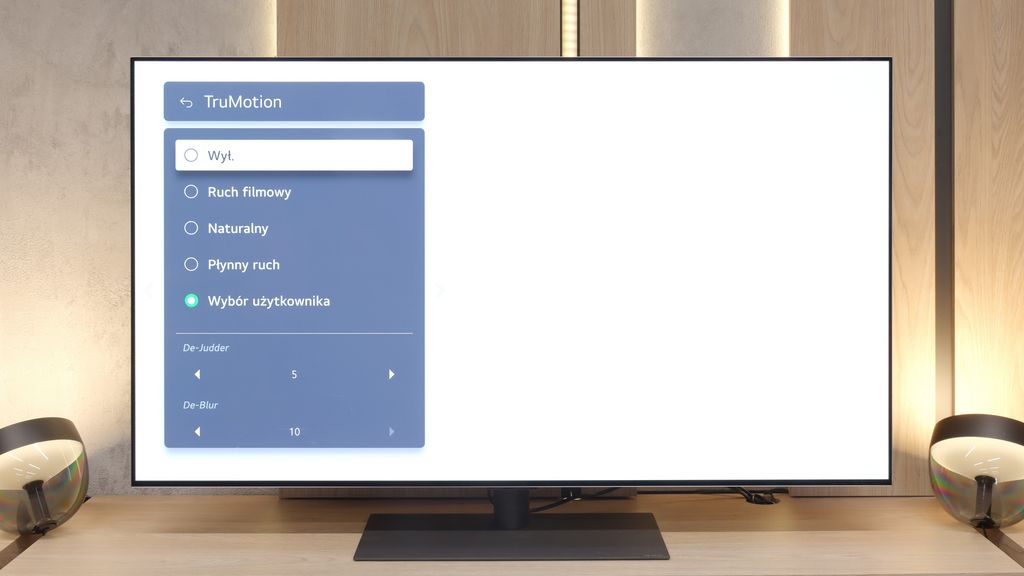

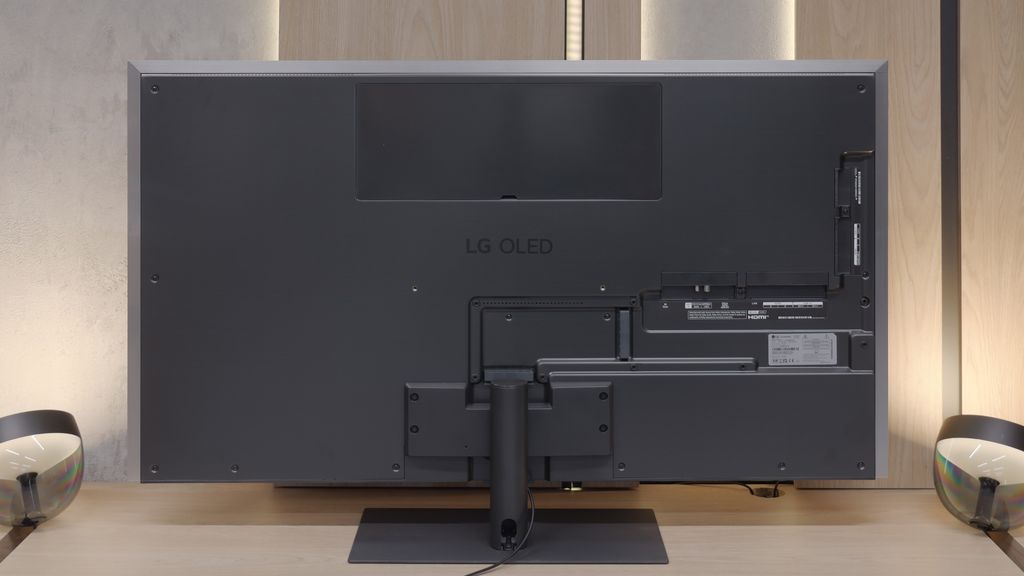
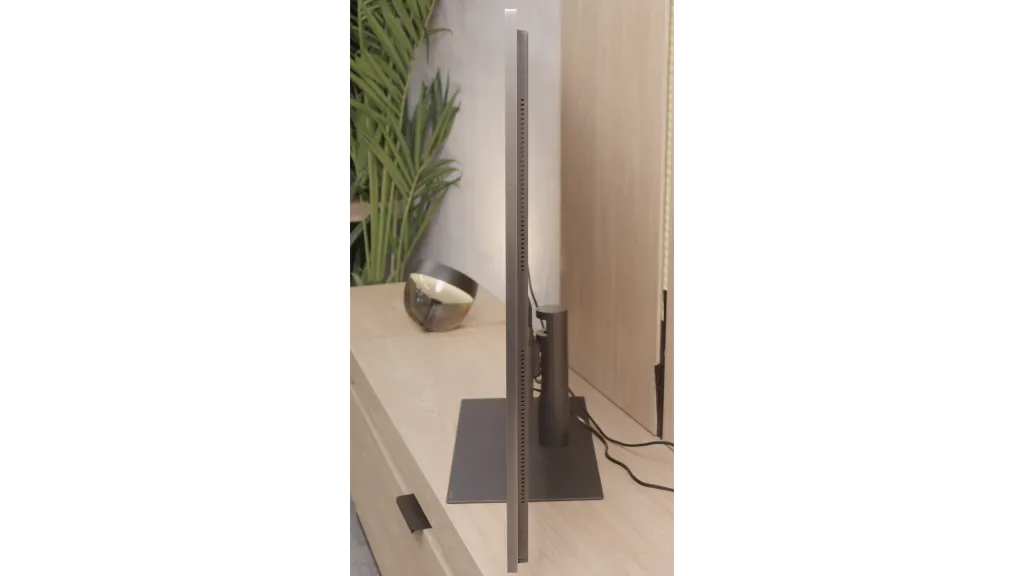
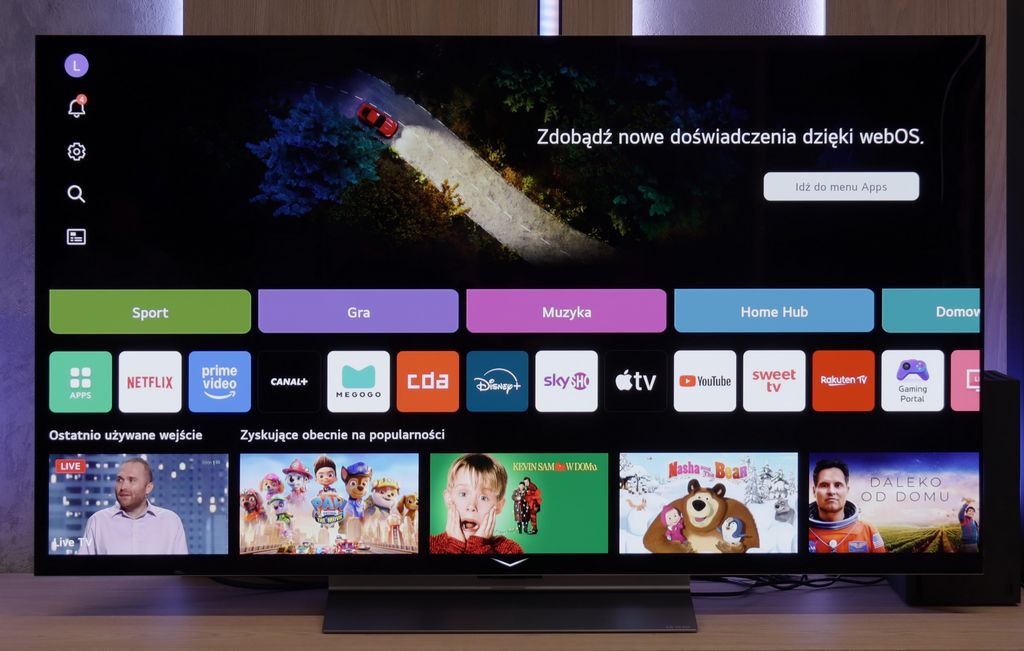
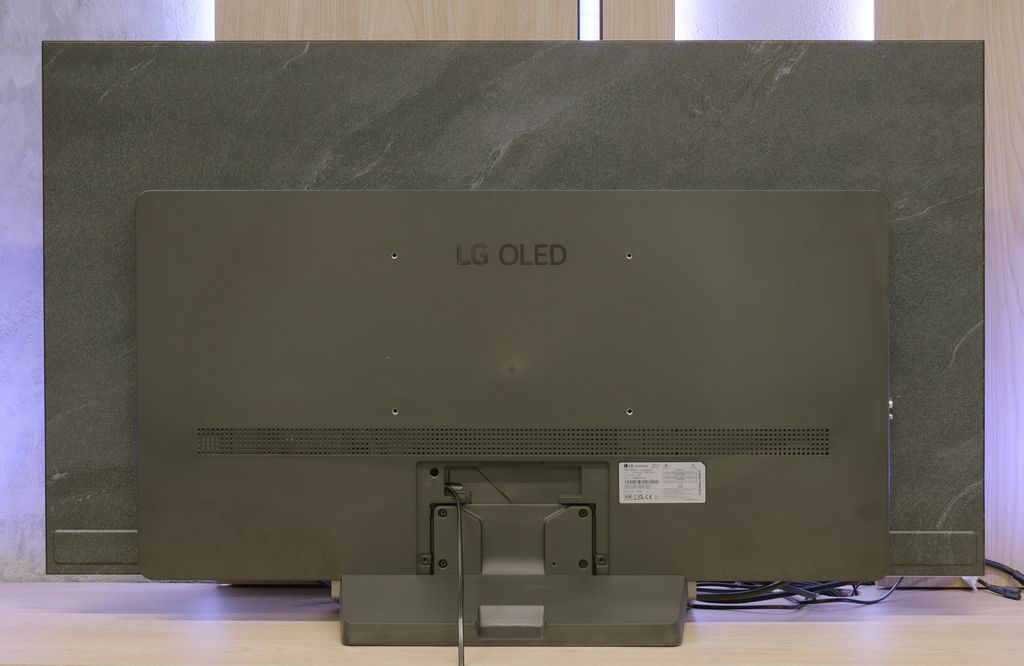
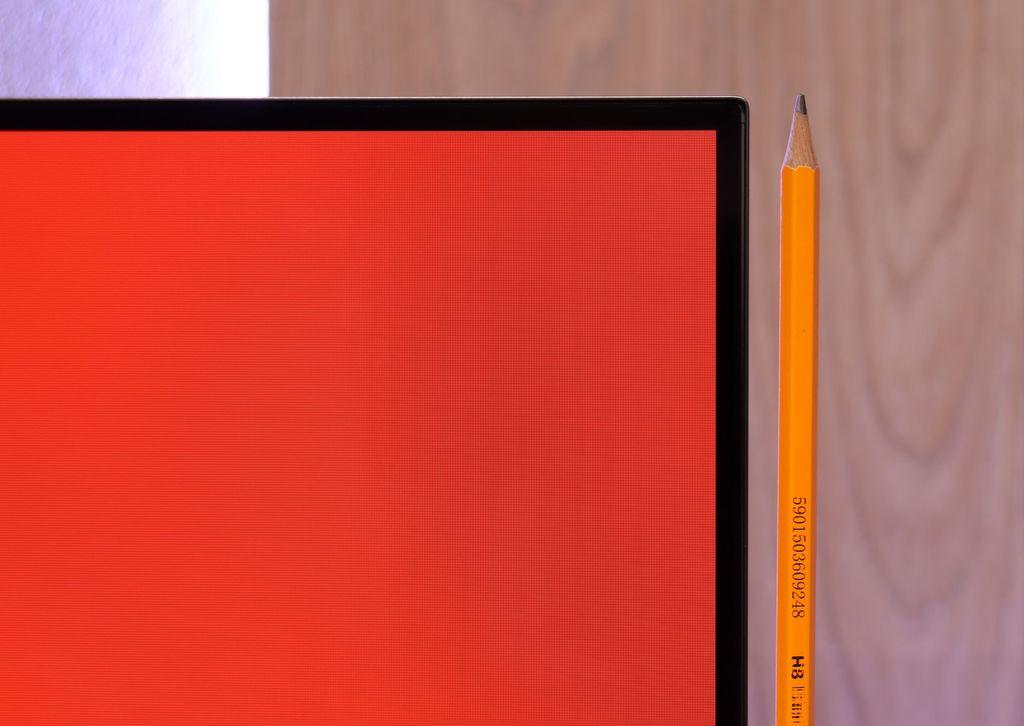

Contrast and black detail
10/10
10/10
Contrast:
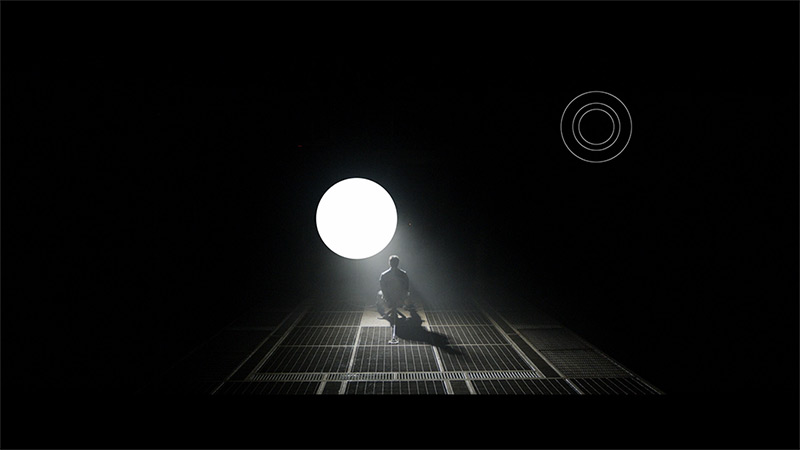
Result
∞:1

Result
∞:1

Result
∞:1

Result
∞:1
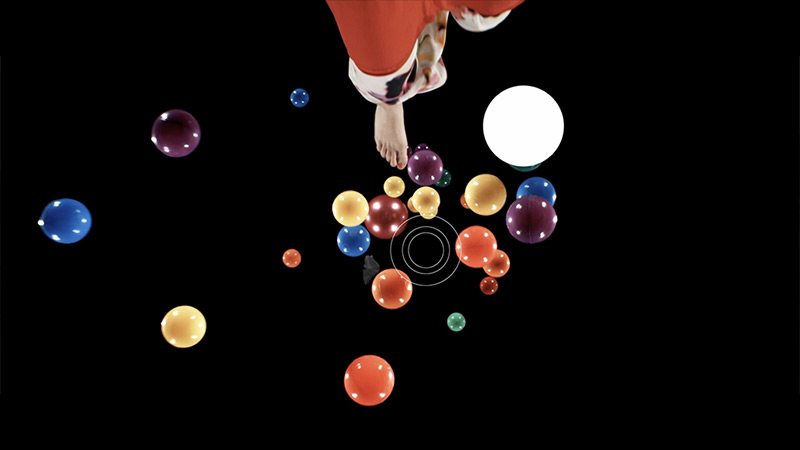
Result
∞:1

Result
∞:1

Result
∞:1

Result
∞:1

Result
∞:1

Result
∞:1
Halo effect and black detail visibility:
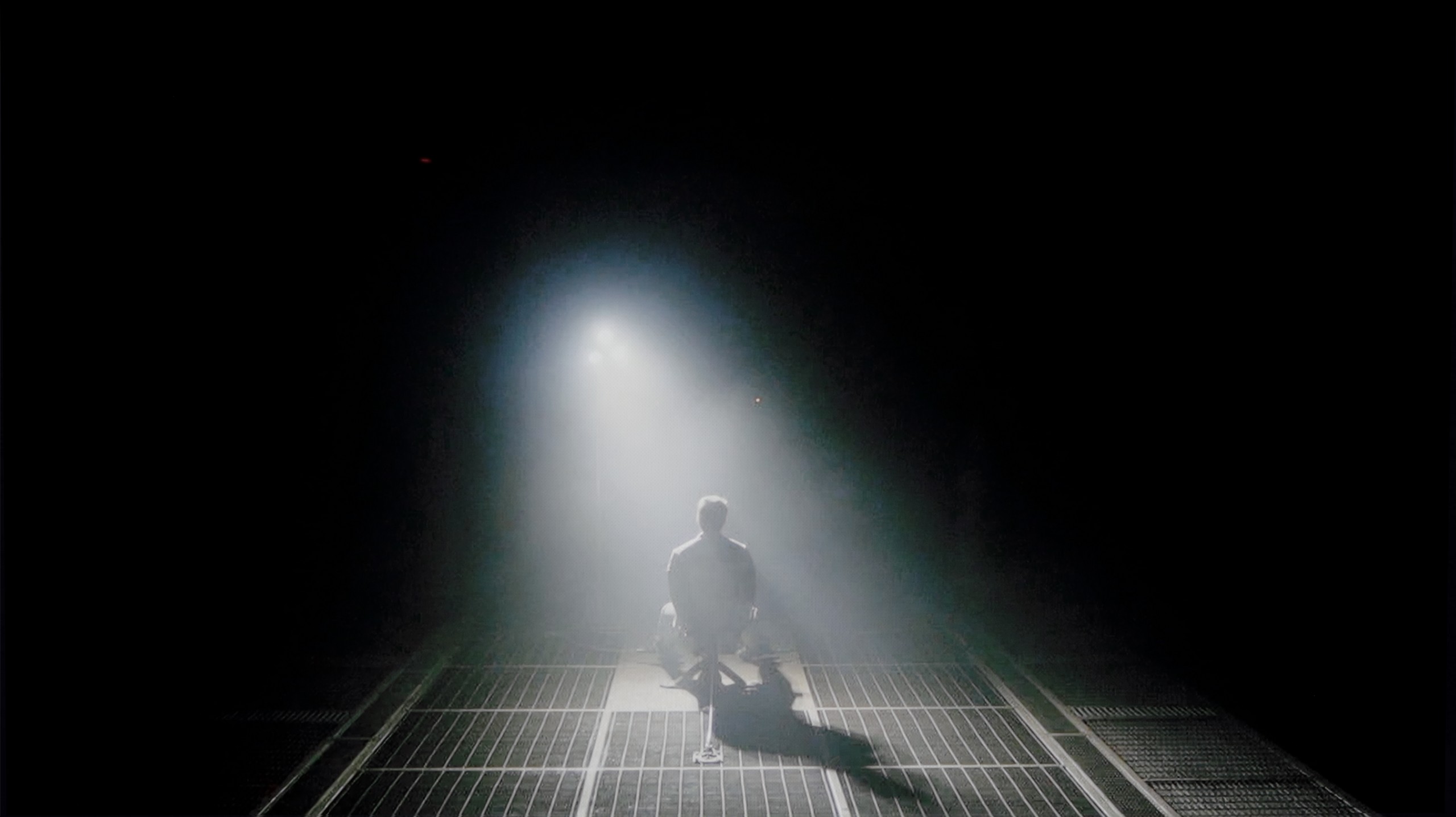

LG G5, as befits an OLED television, impresses with its quality of contrast and blackness. In scenes with a lot of dark areas, the screen looks almost perfect, offering deep, absolute black and infinite contrast – an effect that still cannot be achieved on any LCD television. The new Tandem OLED panel does not introduce any negative changes compared to previous generations – blacks are flawless regardless of the content. Watching scenes from films like The Revenant or Oblivion, the excellent separation of lights is clearly visible, without any halo effect or brightening of dark areas. In this category, the LG G5 deserves the highest rating.
In the category of black and contrast, the LG C5 fits perfectly into what we have come to expect from OLED televisions – it is simply ideal. Thanks to the use of an organic matrix (WOLED), each pixel shines independently, which results in infinite contrast and perfect black. There are no halos, streaks, or other typical LCD television artifacts here. Details in bright parts of the image are perfectly visible, and watching in a darkened room is pure pleasure. If someone is looking for a television for evening screenings with great contrast – the C5 is a very strong contender.
HDR effect quality
9.1/10
7.2/10
Luminance measurements in HDR:

Result
2346 nit

Result
2353 nit

Result
2399 nit

Result
2353 nit

Result
2012 nit

Result
1079 nit

Result
1059 nit

Result
1120 nit

Result
1094 nit

Result
707 nit
Scene from the movie “Pan” (about 2800 nits)


Scene from the movie “Billy Lynn” (about 1100 nits)


Static HDR10


Dynamic: Dolby Vision
Dynamic: Dolby Vision


HDR luminance chart:
LG OLED C5
HDR luminance
Luminance of RGB colors
LG OLED G5
HDR luminance
Luminance of RGB colors
LG G5 with the new Tandem OLED matrix brings the biggest change in terms of the brightness of the television. And it's substantial. This is truly an astronomically bright OLED. In every scene tested – whether it was point lights or full-screen whites from the film The Meg – the brightness on the G5 exceeded 2000 nits. Just a year ago, such values on an OLED were simply unimaginable. And here we are – the G5 is approaching, and at times even surpassing, the best Mini-LEDs on the market. A new feature of the Tandem OLED matrix is also the expanded colour gamut – and here the LG G5 performs almost perfectly. DCI-P3 reaches a full 100%, and BT.2020 is maintained at around 83%. These are some of the highest values currently available on the market – it's hard to find any other television that comes close to such results, unless we are talking about the best displays with QD-OLED panels. The G5 has nearly reference-quality HDR – both in terms of brightness and colour saturation. This is an OLED that can truly shine – and not just figuratively.
LG C5 finally does what we have been waiting for years in the C series – it exceeds 1000 nits of brightness! This is a significant change compared to previous models in the series, and it is very important – because most HDR content on streaming platforms is now created around such luminance. The image finally has the proper "shine," and the details in the highlights look as they should even without the use of dynamic metadata. However, there are scenes where the C5, like most OLED televisions, has certain issues. Especially when the screen needs to light up completely. In our test sequences, such as the bright shot from the film The Meg, the brightness clearly drops. Don't get us wrong, this result is not bad; it's more a reminder that OLED technology still has its limitations. Year by year they are becoming smaller, but still.
As for the colours? They are very good. Although the C5 does not match OLEDs with QD-OLED or Tandem RGB panels, the DCI-P3 coverage of 97% and 73% BT.2020 will satisfy even the more demanding viewers. The colours are saturated, natural, and very consistent in HDR material.
Factory color reproduction
7.8/10
8.2/10


Factory Mode
After calibration


Factory Mode
After calibration
Our test unit, the LG G5, struggled with certain issues in the factory Filmmaker mode. And although most people might have found the picture acceptable, we knew that this television was capable of much more. This mode had a clear excess of blue tint in the white balance, resulting in a significantly cooled image – particularly in HDR modes, where there was additionally a lack of red. The picture appeared cold, and its sharpness was artificially boosted and unnatural. Another significant issue was the brightness characteristics. In SDR content, the situation wasn't the worst, aside from a slight dimming of the entire image. However, it performed much worse in HDR materials – due to improper brightness management, the smallest details could completely disappear from the image, while larger, bright elements looked overexposed and lacking in gradation. Fortunately, the G5 supports calibration using 3D LUT (a tool for professionals for colour calibration), so we decided to make use of its professional capabilities and see what it could really do. Because although it wasn't tragic even before calibration, the potential of this television definitely deserved more.
LG C5, like other televisions we have tested, has been checked in the best possible factory mode – which remains the Filmmaker Mode. And here we have good news: in SDR materials, LG has once again done a solid job. The white balance and colour reproduction right out of the box are at a very high level. Most errors – both in balance and in the colour test (Colour Checker) – did not exceed a ΔE value of 3, which is the threshold above which differences become visible to the naked eye. Such factory settings would be desirable in a significantly larger number of televisions!
However, the situation looks different for HDR content, which is precisely what the C series was created for. Here, the C5 performs somewhat worse. The excessive presence of blue in the white balance causes the image to appear distinctly cooler – which affects, for instance, unnaturally pale skin tones or a slightly shifted tone of the entire scene. Fortunately, LG provides very precise calibration tools, and we – as always – made use of them.
Color reproduction after calibration
9.8/10
9.4/10




After performing the calibration process using professional tools, we can confidently state that the LG G5 offers nearly reference-quality image. Most of the errors related to white balance and the ColorChecker test are below a value of 2, which is a phenomenal result, practically imperceptible to the human eye. And while one could still nitpick that in HDR films the television still has a tendency to slightly dim the smallest elements of the image, in practice this does not negatively affect the overall impression. Kudos to LG, as once again they provide the user with enormous possibilities for adjusting their display – and this, combined with the very good parameters of the panel itself, results in an image that is truly hard to beat.
We must honestly admit – in the case of the LG C5, very little was needed to achieve nearly perfect picture quality. After calibrating, we managed to reach compatibility with reference screens at a level that impresses even when compared to significantly more expensive models. The image after our adjustment looks exactly as filmmakers and series creators would want it – without colour distortions, with natural depth and subtle texture. LG has done a great job this year regarding factory settings and calibration potential. Chapeau bas!
Smoothness of tonal transitions
8.5/10
8.2/10












The fluidity of tonal transitions in the LG G5 is a notable step forward compared to last year's model. Not only has brightness been improved, but also the method of blending colours, which the G4 sometimes struggled with. In the vast majority of scenes, the G5 has no issues with tonal transitions – there is no visible banding typical of WOLED technology, nor are there unsightly breaks between colours. Of course, in very dark areas of the image and with shades of grey, minor imperfections can still be noticed, but these are things that the average viewer would not even register. In short – it is really good.
WOLED televisions have not been known for their perfect fluidity of tonal transitions until now. It has often been noticeable that there were subtle bands between colours – particularly in the darker parts of the image – which gave the impression that the hues did not transition smoothly, but rather "stair-stepped" slightly. This year, LG has made significant progress. In the C5 model, this issue has largely been eliminated. Indeed, in very dark scenes, subtle boundaries between colours can still be seen, but they are non-intrusive enough that hardly anyone except for more discerning viewers will notice them. For most users, the fluidity of tonal transitions in the C5 will simply be impeccable.
Image scaling and smoothness of tonal transitions
8.7/10
7.8/10
Smooth transition function
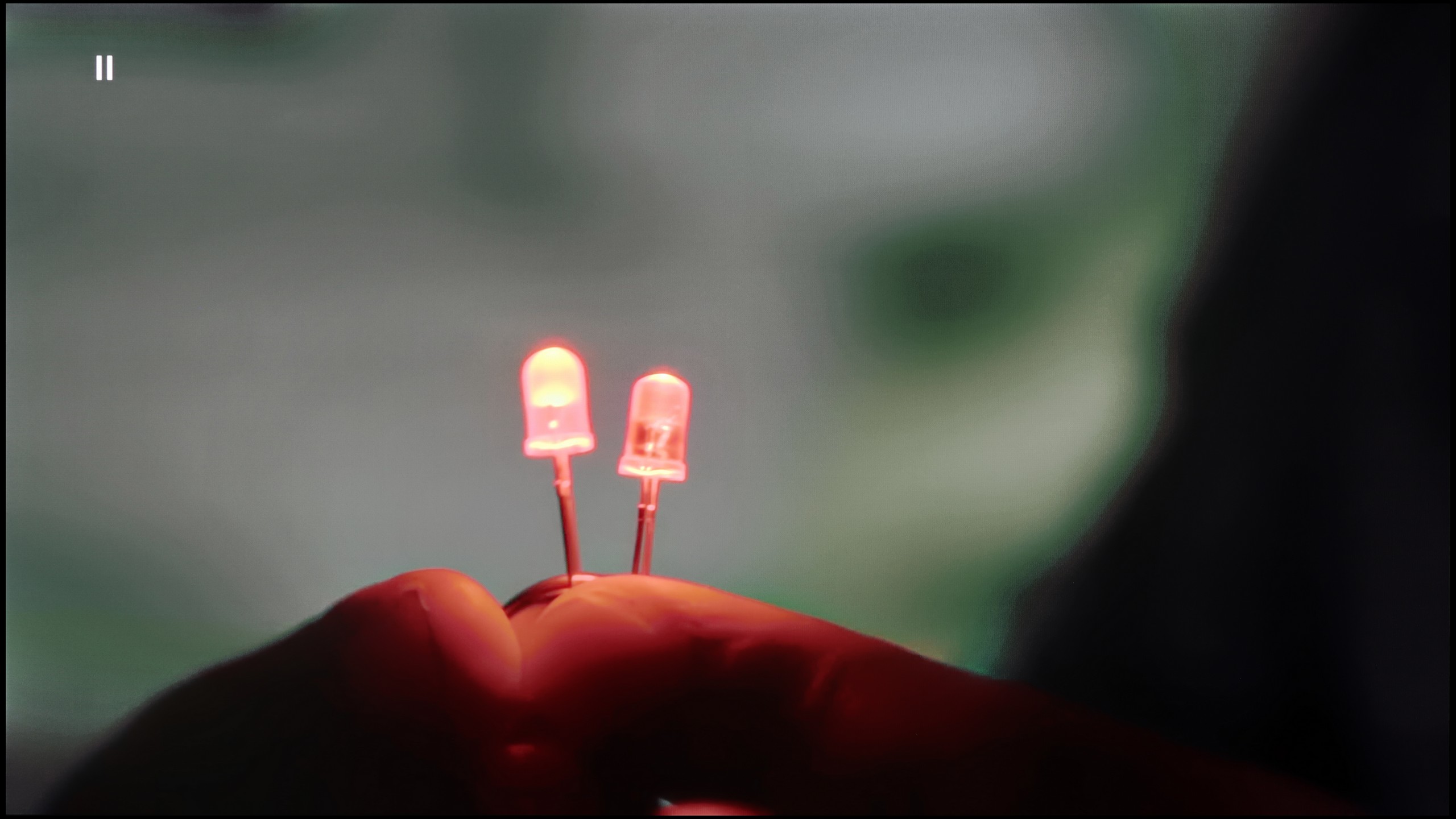
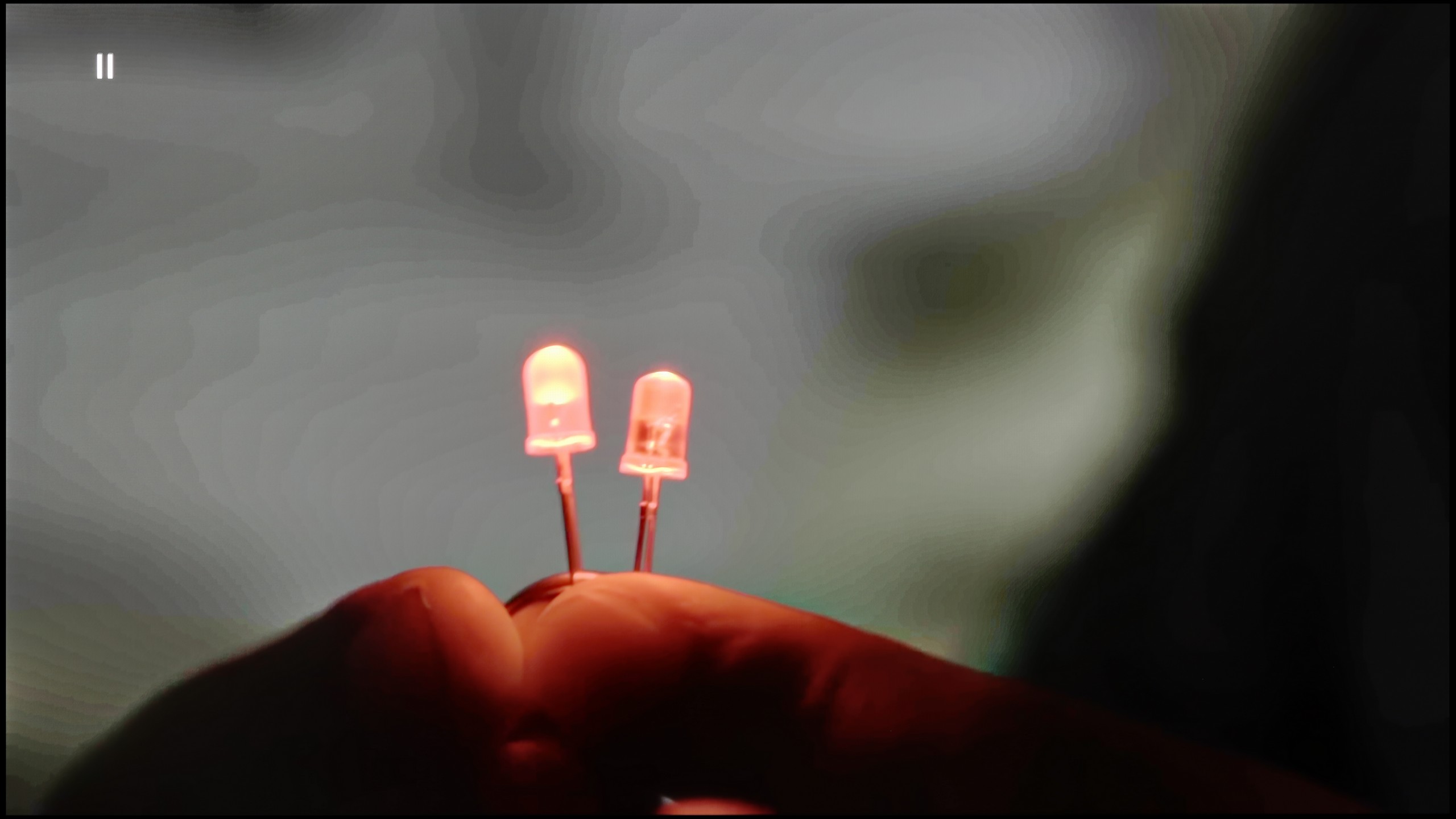
Image without overscan on the SD signal


Upscaling and digital image processing in the LG G5 are quite impressive. The television handles lower quality content very well, especially when the "Smooth Gradation" feature is set to a low level. In this mode, it effectively removes unwanted artifacts and issues with visible tonal transitions. It may also slightly smooth out some desirable details, such as the subtle texture of clothing or skin, but importantly – it does not remove film grain, so it's difficult to speak of a serious compromise here. This is one of those options that is definitely worth enabling.
The G5 also performs well with upscaling, which improves the quality of older materials. The test image with the model looked really solid – slight jaggedness was visible, but that's an effect that cannot be completely avoided. Additionally, there were no problems with overscan, which – contrary to appearances – is not at all obvious, even in 2025.
LG C5 handles lower quality materials really very well. One of the main problems older WOLEDs faced was posterisation – that is, unwanted “stair stepping” in colour transitions. The C5 utilises a system feature that smoothens these transitions, which works surprisingly effectively. The banding effect is nearly completely eliminated, and the picture gains in coherence. Compared to last year's model, we have the impression that this feature works slightly less effectively – but the good news is that it does not undermine the structure of the image. Film grain, textures, and details remain on the screen – nothing is unnaturally smoothed out.
The C5 also excels at enhancing the quality of older recordings. Thanks to the α9 Gen6 processor (8th gen), the "scaling to 4K" performs really solidly. The image is clear, the details are sharp, and the only minor downside might be slightly noticeable edge sharpening on some borders. However, there is no issue with overscan here – the image is neither artificially cropped nor shifted, which is a significant plus and still not a given.
Blur and motion smoothness
8.5/10
8.5/10
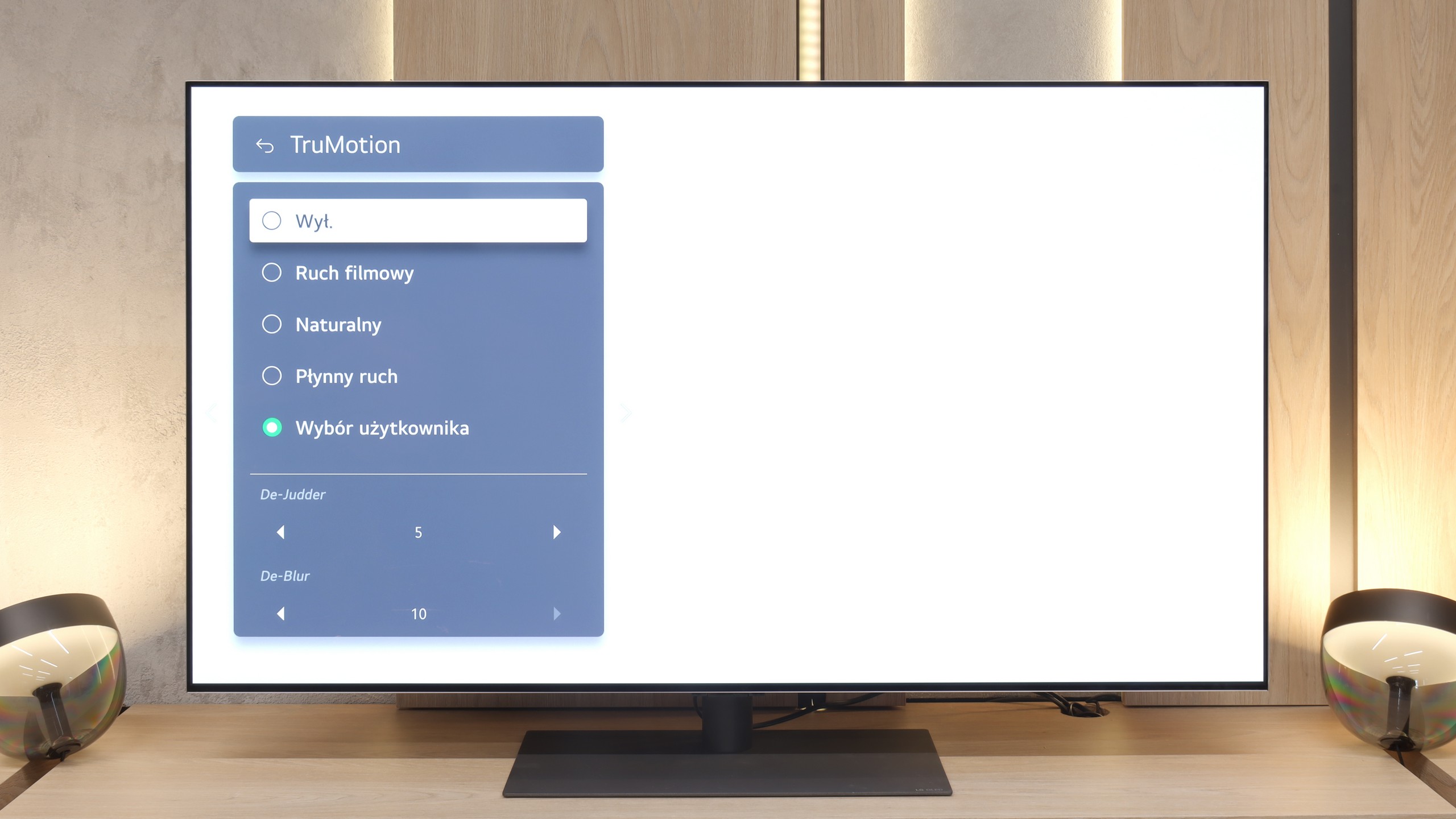
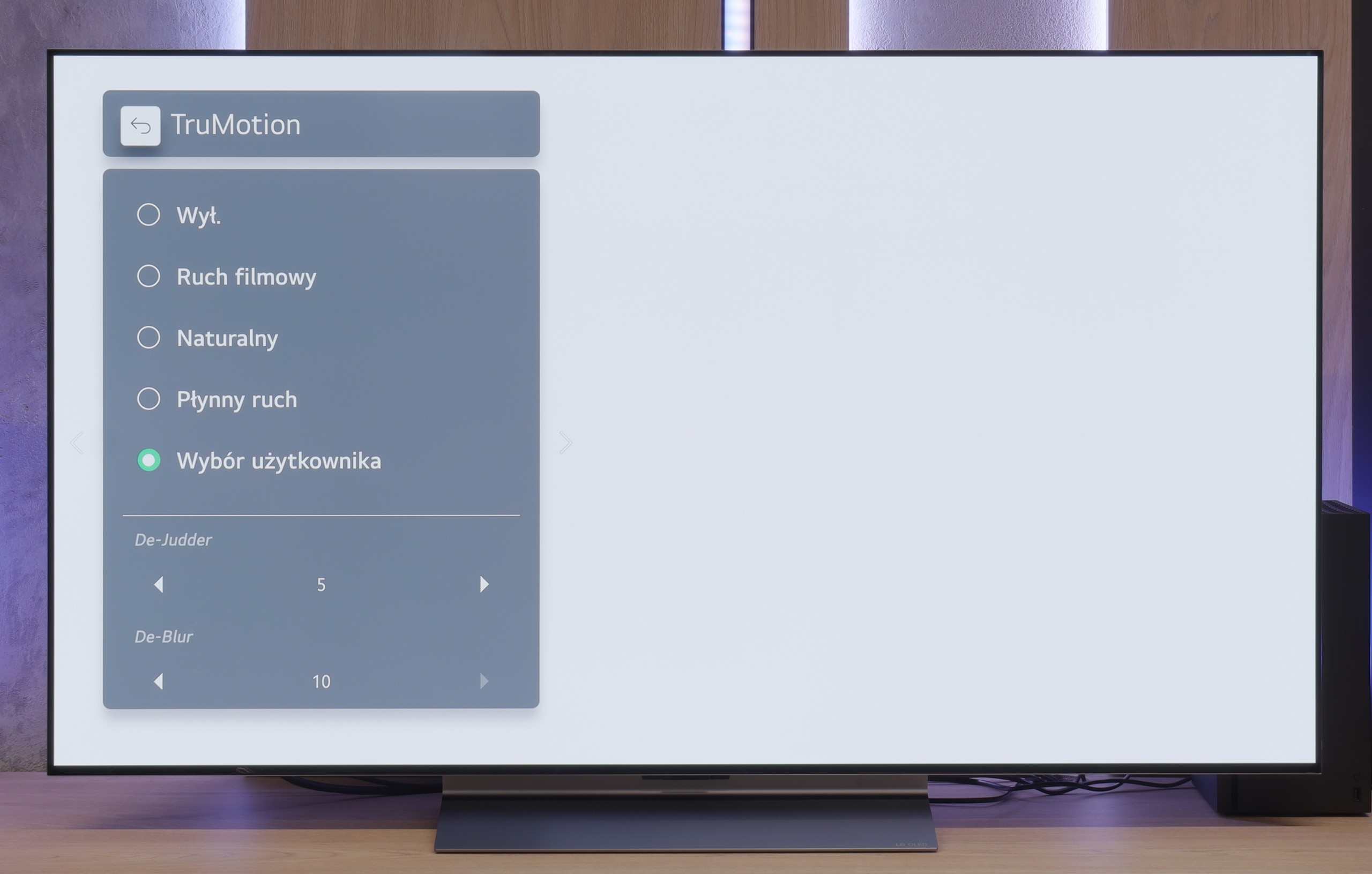
Blur (native resolution, maximum refresh rate):






Blur (BFI function enabled):
Image flickers in this mode



Image flickers in this mode
Blur (4K 165Hz):



Blur ():
The motion smoothness on the LG G5 is simply phenomenal. The television is equipped with a 165 Hz refresh rate panel, and this, combined with the instant response time of the OLED matrix, delivers incredible results. The image does not tear or stutter like on traditional LCD televisions. Like most LG models, the G5 is equipped with a motion smoother, which can be useful when watching films – we are, of course, referring to the TruMotion mode. With the "De-Blur" and "De-Judder" sliders, we can adjust the smoothness of older materials according to our own preferences, whether we want to maintain the characteristic film stuttering or lean towards a more fluid, television-like effect.
The LG C5 is equipped with a 144 Hz display, and this, combined with the virtually zero response time of the OLED pixels, makes it one of the best screens for watching dynamic content. It doesn't matter whether it's sports, fast-paced games, or just action – the image is razor-sharp.
And what about movies at 24 frames? LG thought of that too. The built-in "TruMotion" smoother allows you to adjust the picture to your own preferences. The "de-judder" slider increases fluidity in films, while "de-blur" gently reduces motion blur – though to be fair, it is nearly invisible here anyway.
Console compatibility and gaming features
10/10
10/10
- ALLM
- VRR
- VRR range40 - 165Hz40 - 144Hz
- Dolby Vision Game Mode
- Correct implementation of HGIG
- 1080p@120Hz
- 1440p@120Hz
- 4K@120Hz
- Game bar
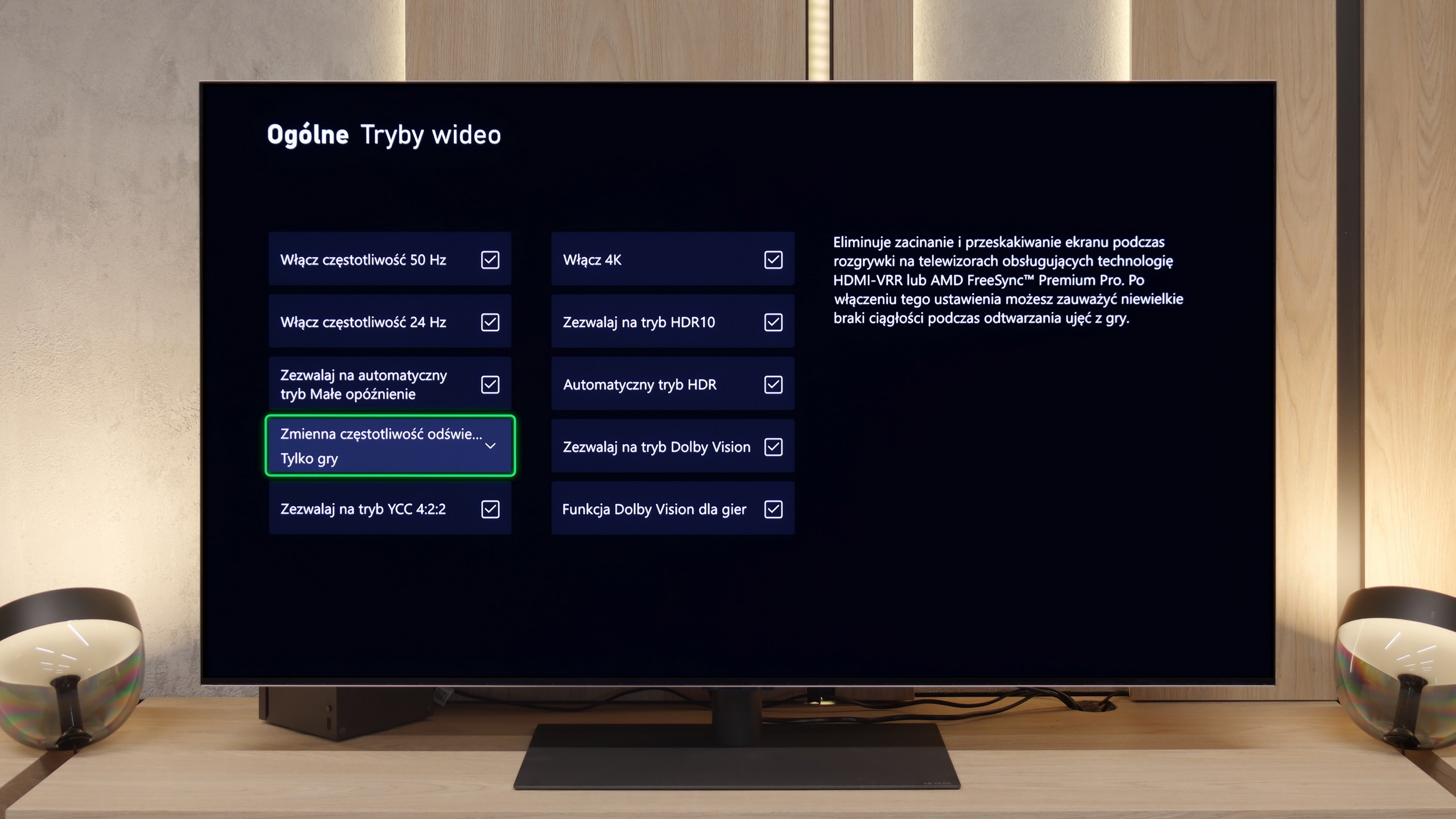
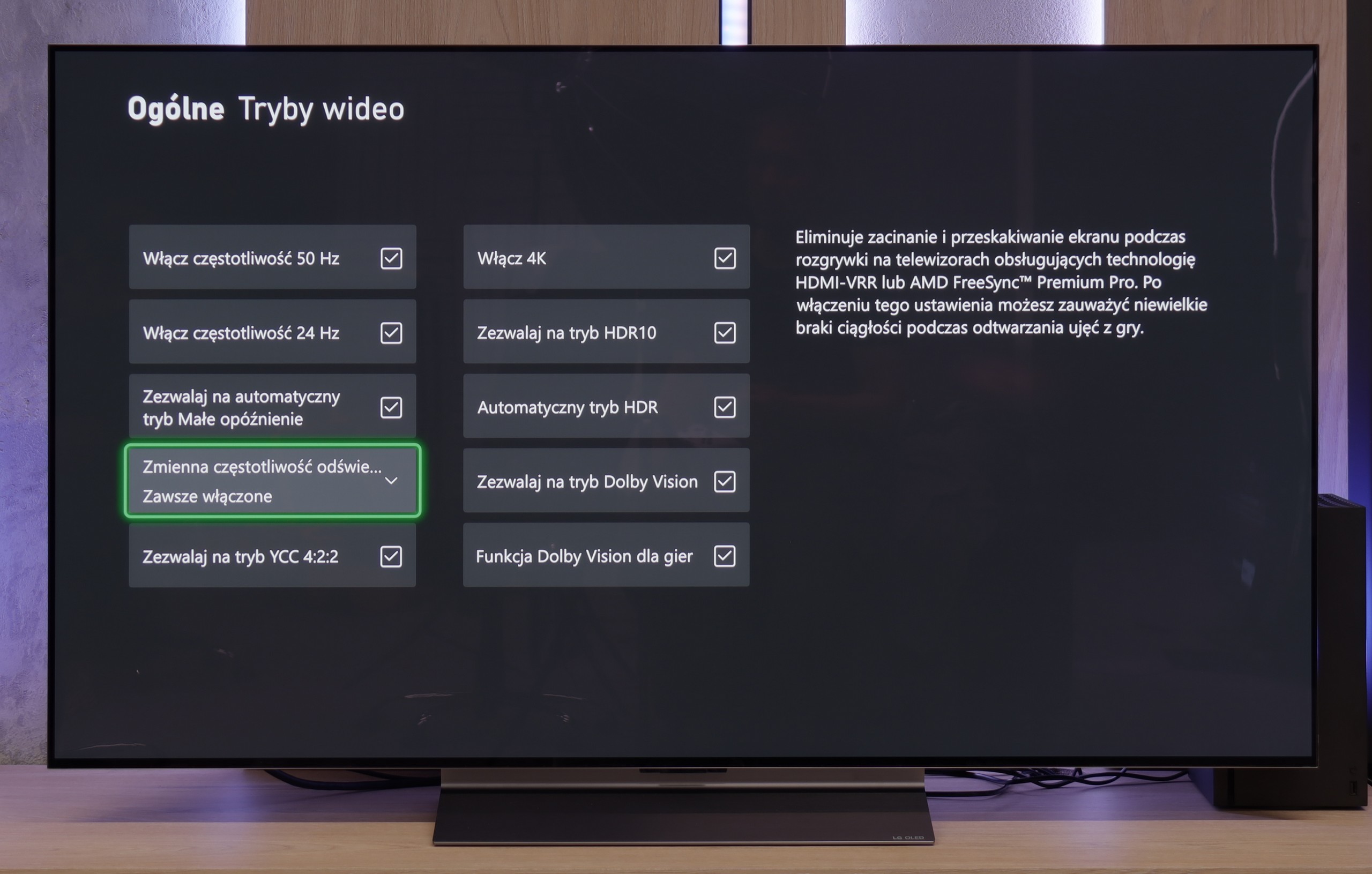
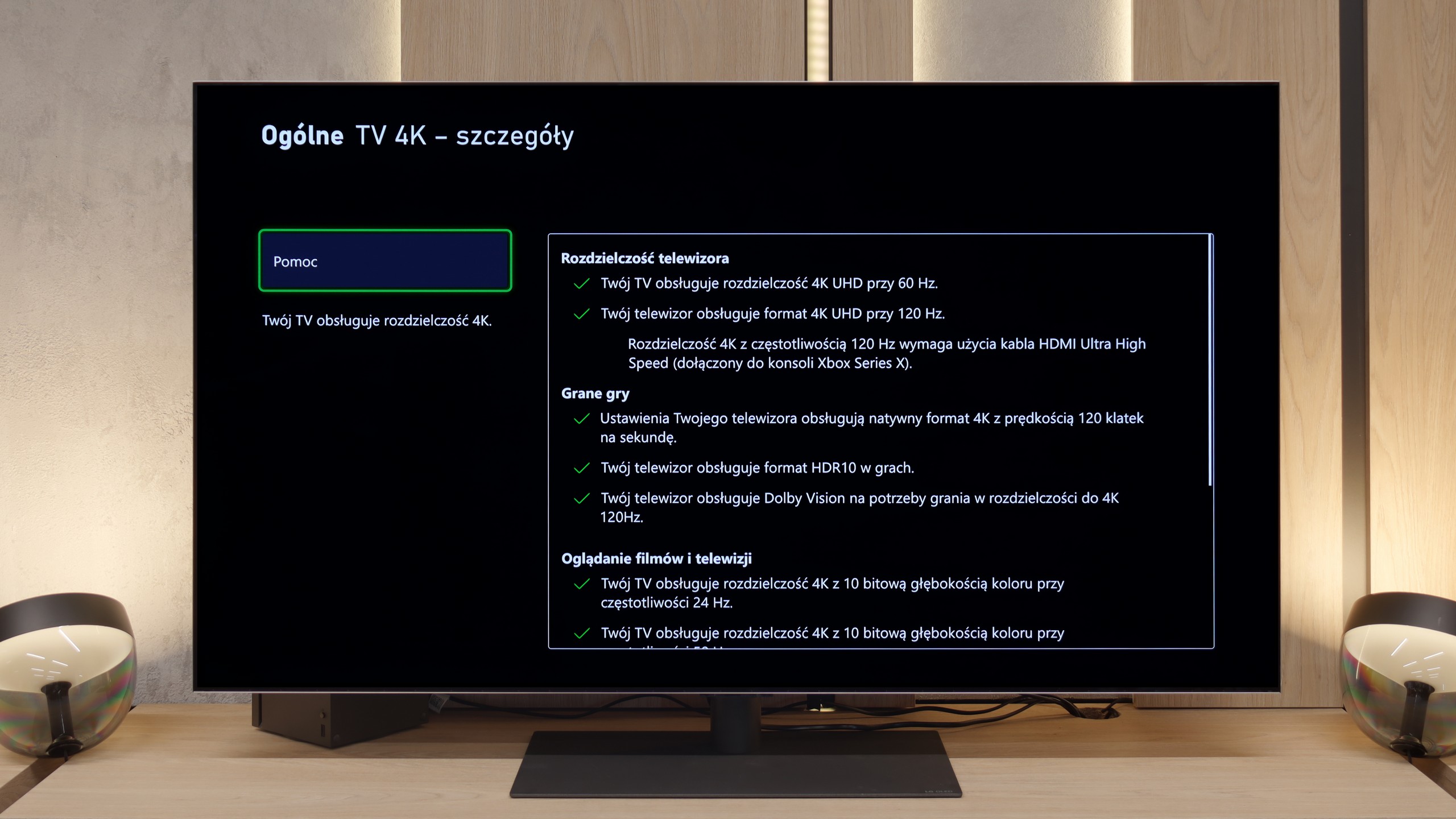
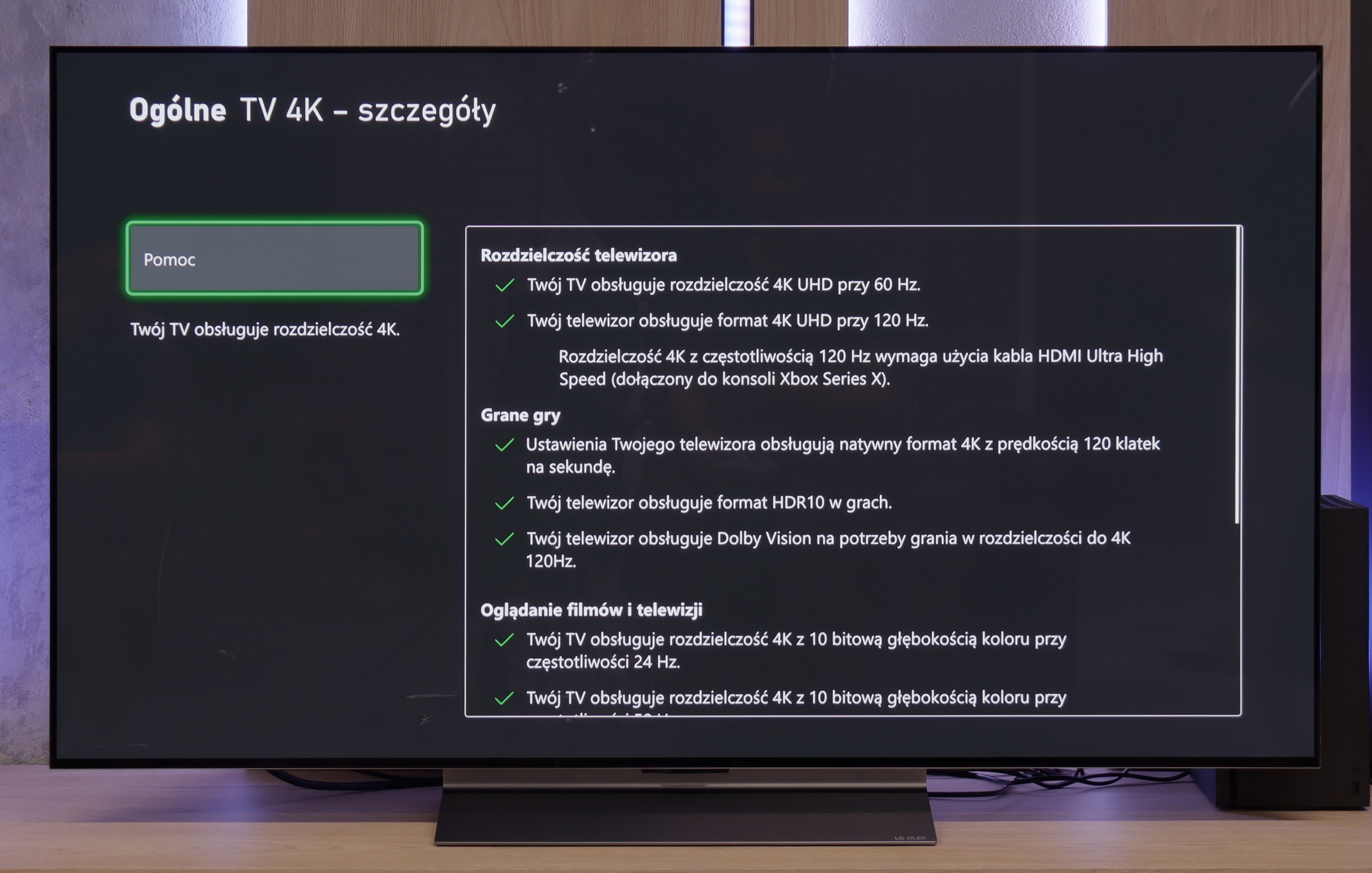
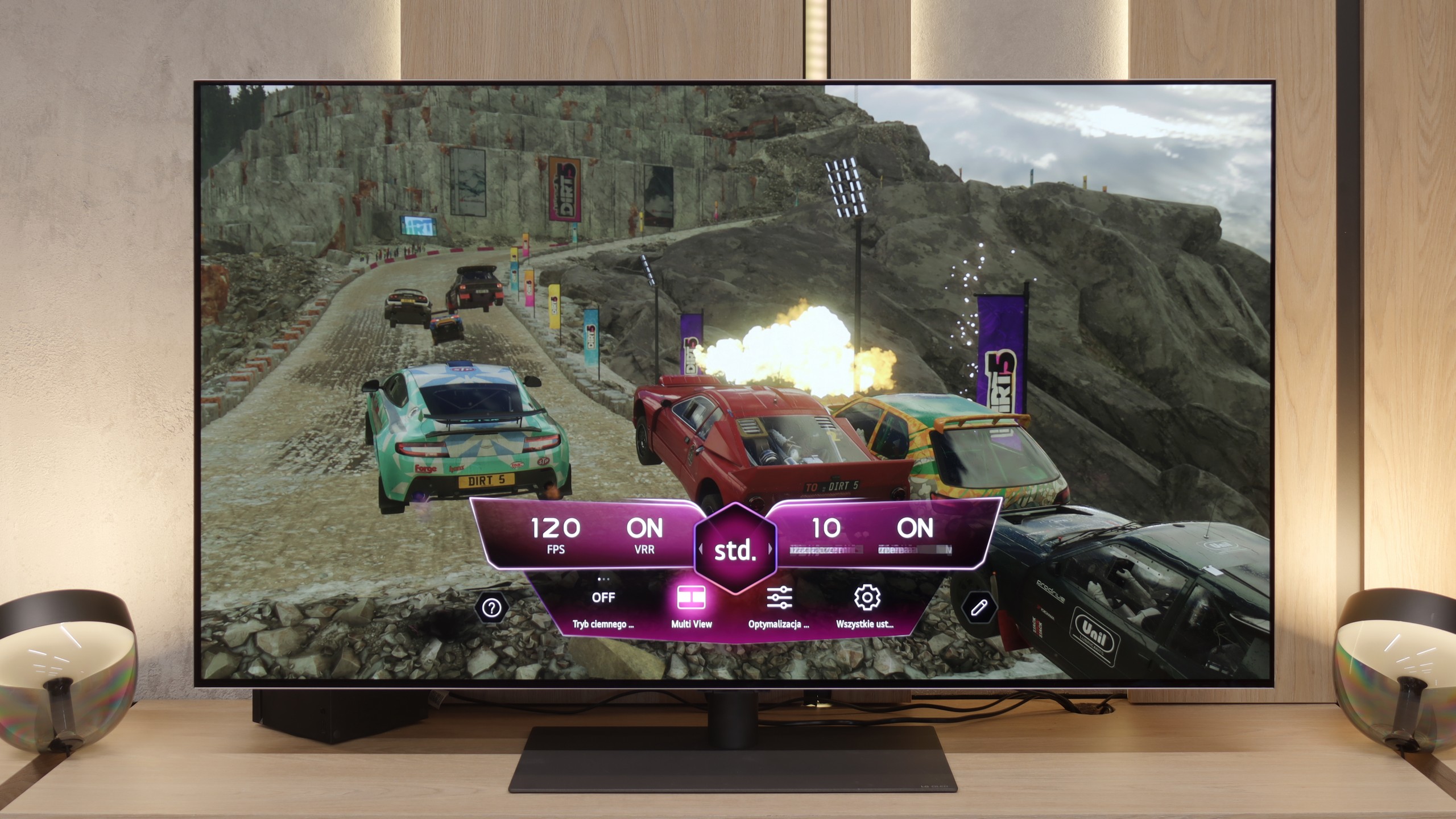
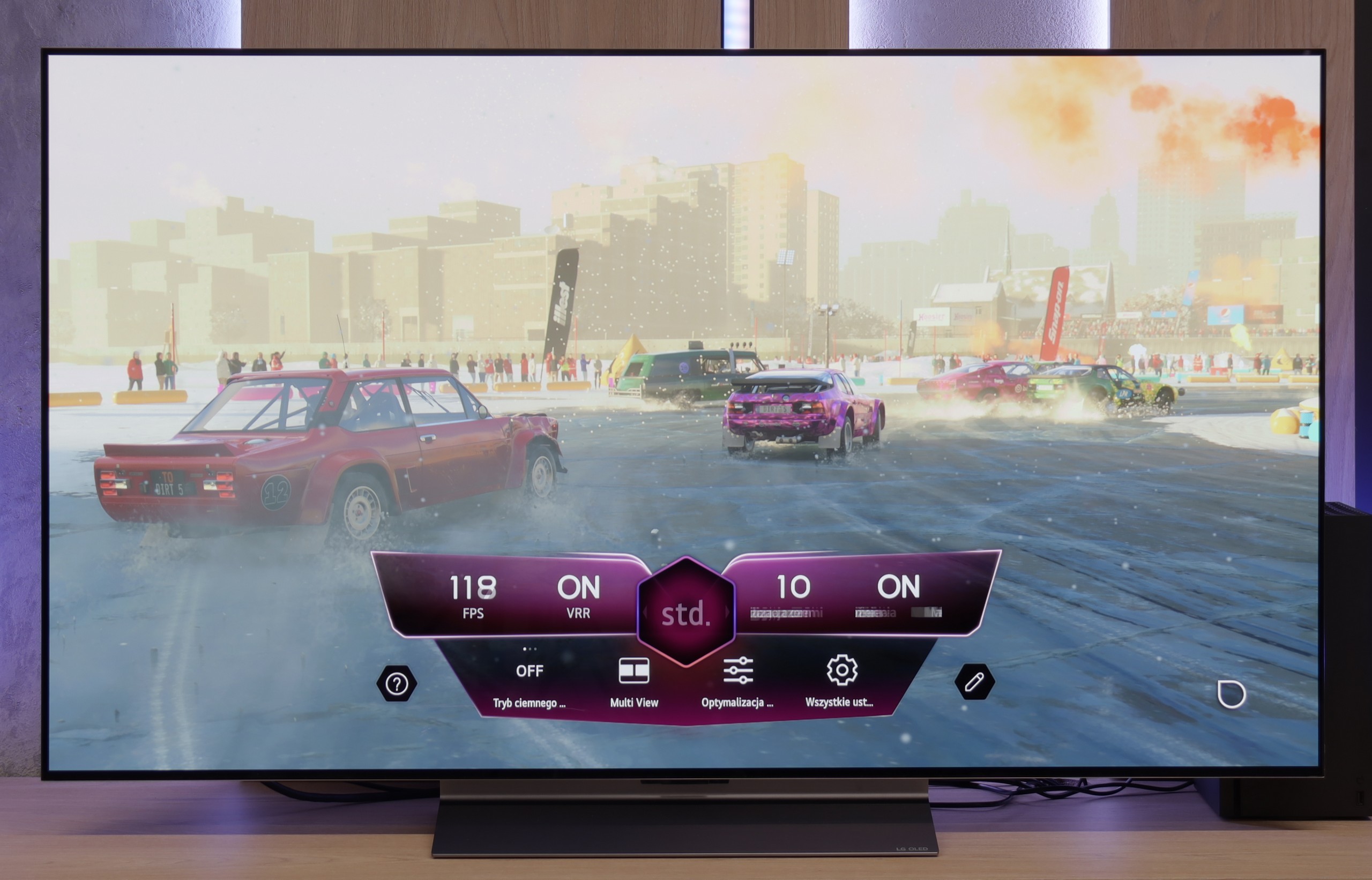
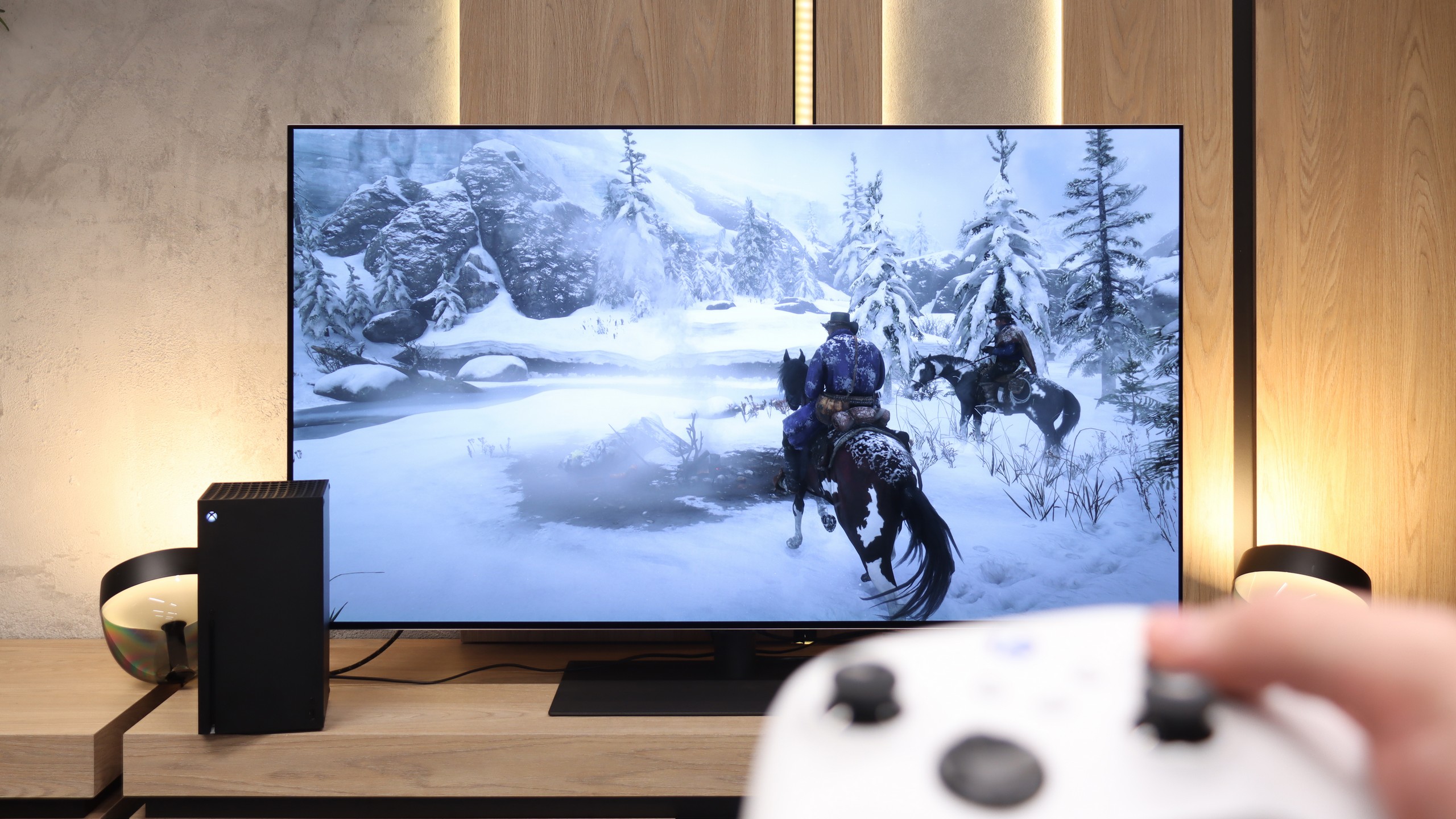
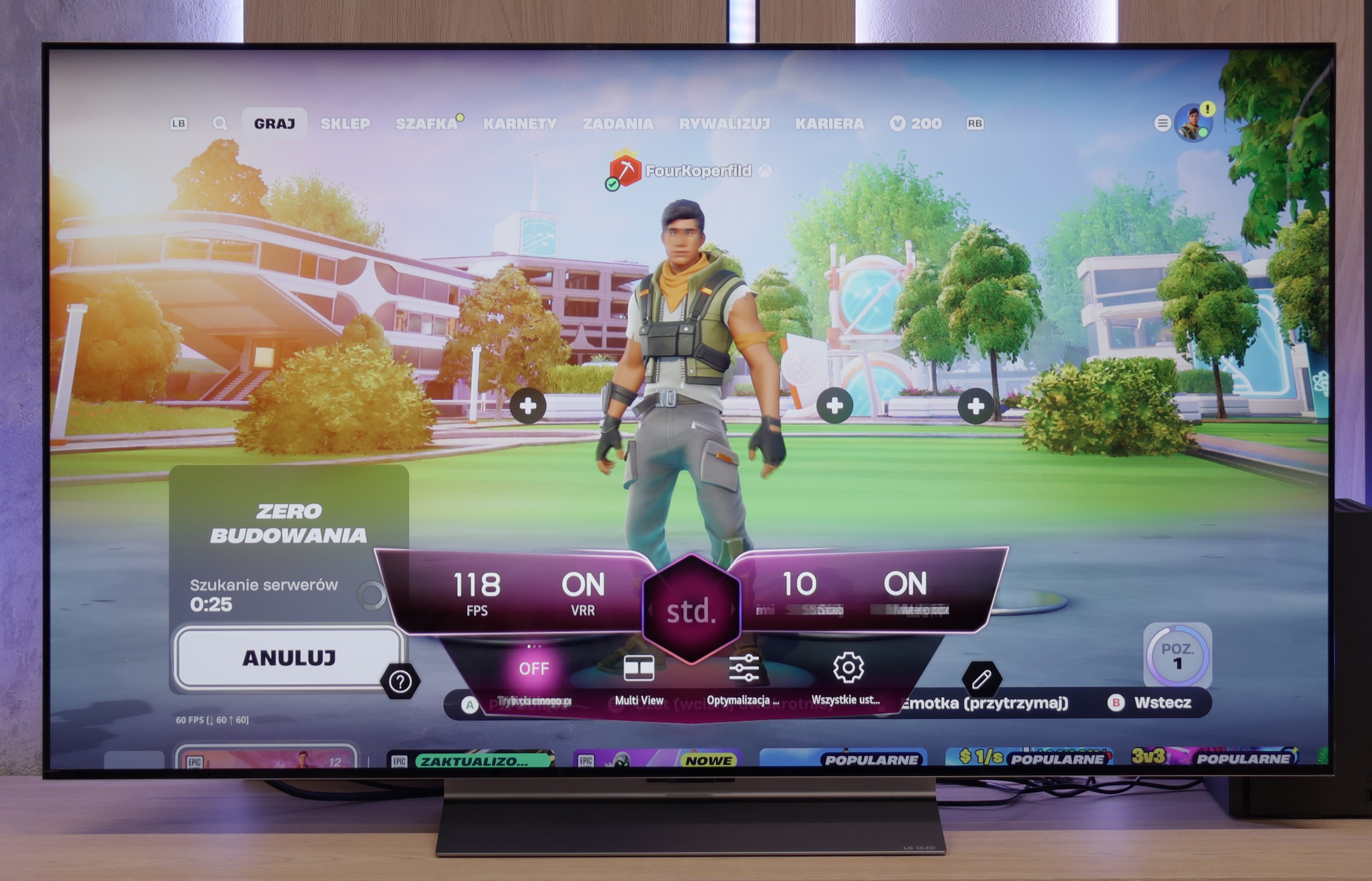
Features for gamers? Perfect. That should be sufficient for you to know what level we are dealing with here. The G5 is a television designed with gamers in mind, so we will find literally everything you could expect from a gaming screen. There is a Game Bar, there is support for high resolutions with high refresh rates – that is, 4K at 120 Hz, and even more, as the panel has a refresh rate of 165 Hz (which PC gamers will benefit from). The television supports variable refresh rate (VRR), automatic low latency mode (ALLM), and also correctly handles HDR in games thanks to the HGiG function. All of this adds up to one of the best sets of gaming features available on the market. Well done, LG.
LG C5 is a television designed with gamers in mind – and there isn't a hint of exaggeration in that. It's hard to find anything to criticise here. We have a refresh rate of 144 Hz, full support for VRR, ALLM, and as many as four HDMI 2.1 ports with a full bandwidth of 48 Gb/s. For those who have an Xbox, PS5, Nintendo, and a gaming PC all in one room – there are no limitations, everything can be connected without any hassle.
The HDR configuration for games also poses no problems. The television correctly handles the HGiG mode, which allows for an image that matches the creators' intentions. For those interested, there is also Dolby Vision in Gaming mode, although we still recommend HGiG as the most predictable and "pure" version of HDR in games.
It also features Game Bar, which serves as a "command centre" for gamers. Everything important, from VRR settings, to picture modes, to frame rate information – is at our fingertips. The interface is simple and clear. It may look like it’s from a spaceship simulator, but it serves its purpose and just works; as it should.
C5 is truly a complete set for any gamer.
Input lag
9.9/10
10/10
SDR
HDR
Dolby Vision
The input lag on the LG G5 is incredibly low. The reaction time to our actions – whether we're playing with a controller, keyboard, or mouse – is almost perfect. The controls are instantaneous, and the game responds exactly when we expect it to. The Dolby Vision Gaming mode does introduce slightly higher latencies, but even then it's hard to nitpick – in the worst case, the values hover around 20 ms, which for most gamers will be practically unnoticeable.
The reaction time of the LG C5 to our movements with the controller is exemplary. Regardless of the chosen resolution or frame rate, the delay is so low that in practice it is almost imperceptible. Playing on this television is simply pure pleasure. Some delay is introduced by the Dolby Vision mode, which should come as no surprise – this applies to virtually every television on the market equipped with this mode. Nonetheless, even with Dolby Vision active, the input lag remains low enough that gameplay is still smooth and responsive.
Compatibility with PC
8.8/10
8.6/10
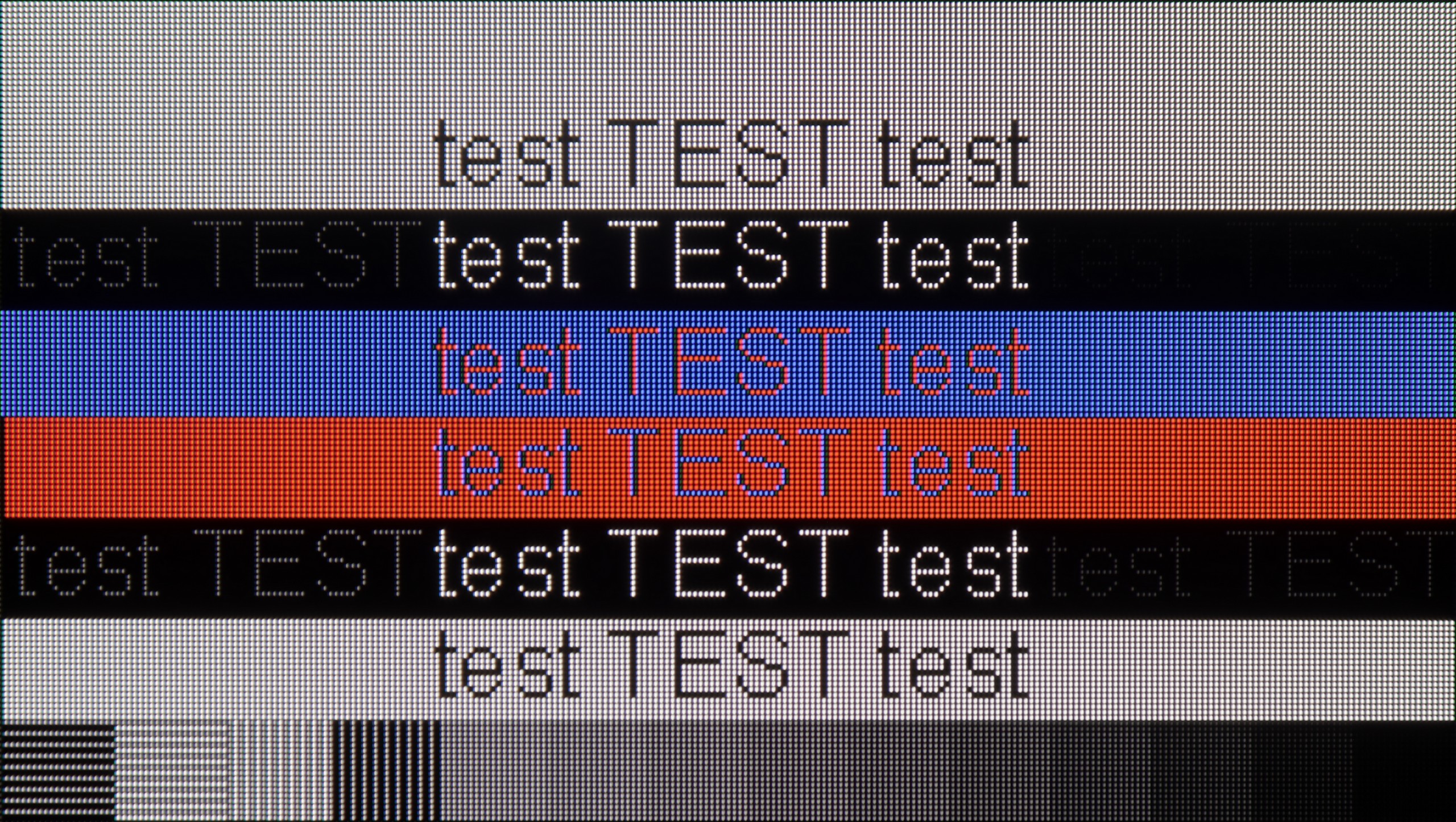
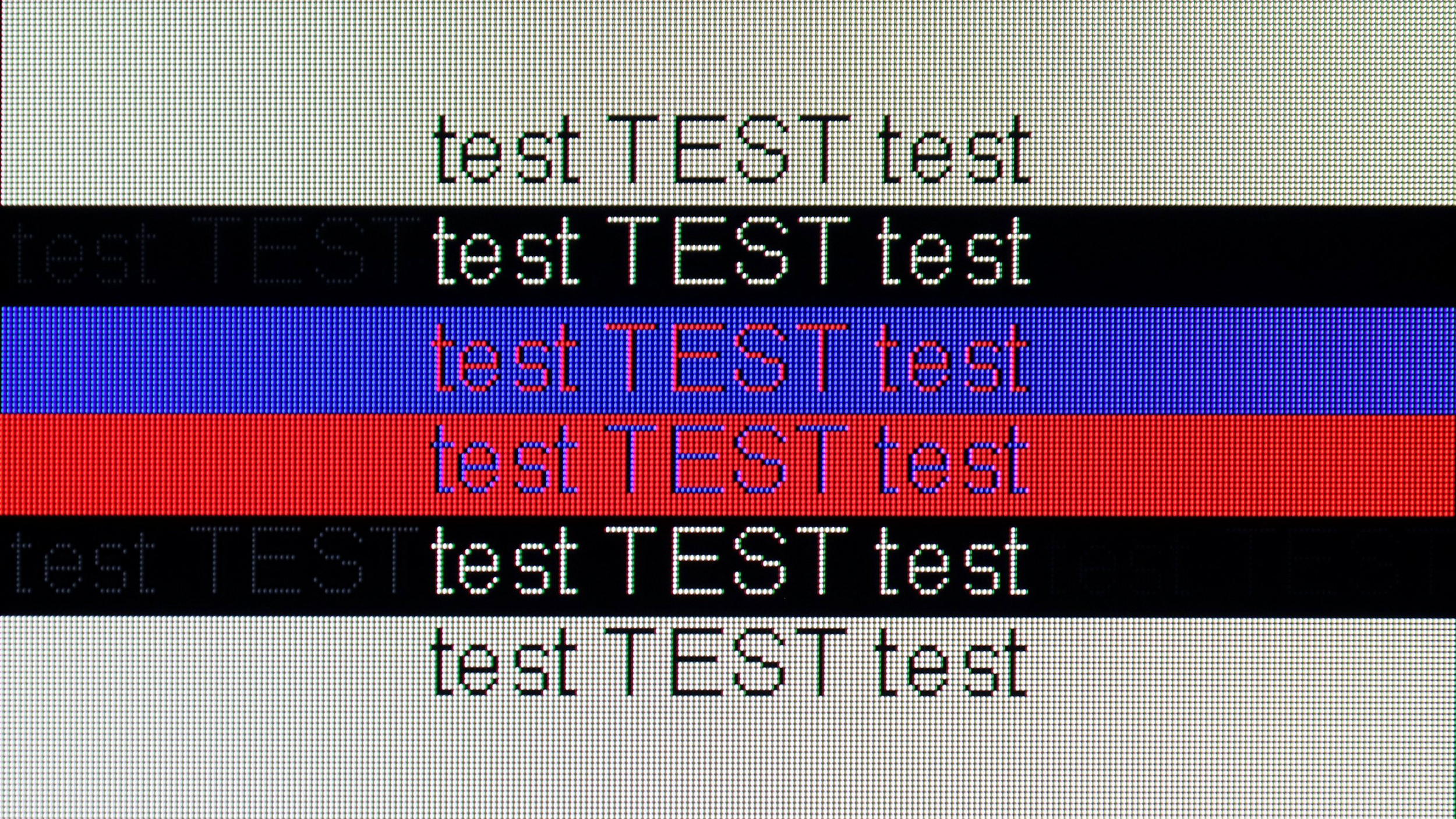
Collaboration with a PC? Nearly perfect. The television, as we mentioned earlier, has fantastic features for gamers – including those using a PC. Onboard, we find full G-Sync certification, a 165 Hz panel, and a super-fast input lag of around 5 ms. Thanks to the correct implementation of chroma 4:4:4, fonts are very easy to read – both the smallest and the largest. Although due to the WRGB subpixel layout, there may be slight shadows around the characters, for most users this effect will be virtually unnoticeable. The G5 excels as a screen for work, entertainment, and gaming – also from a computer.
C5 – as we wrote – is a television created for gamers, so playing even on a computer is a real pleasure. The 144 Hz panel, low input lag, and original G-Sync certification only confirm this.
When it comes to work – it is also very good. Fonts are legible, the interface is clear, but it should be remembered that we are dealing with a WOLED panel and a WRGB subpixel arrangement. (slight shadows visible behind the font). Therefore, if someone plans to place the C5 on a desk in smaller sizes like 42 or 48 inches for everyday office work, it is worth checking this for themselves beforehand. For occasional desktop use and primarily for gaming – there are no reasons for concern.
Viewing angles
7.5/10
7.4/10
The viewing angles on the LG G5 are very good, mainly due to the use of a WOLED panel. It's hard to find fault here – the image does not significantly lose brightness or quality even when viewed from the side. However, it should be fairly noted that there is a slight regression compared to the G4 model. The predecessor used an MLA panel with micro-lenses, which offered slightly better light distribution. Also, compared to QD-OLED panels, the angles are worse. Nevertheless, the overall perception of the image at an angle remains very good and should not be an issue in everyday use.
The viewing angles on the LG C5 are nearly perfect. Although they fall slightly short compared to technologies such as QD-OLED or WOLED with micro-lens MLA, the picture quality from a large angle still leaves a great impression. Colours remain vibrant, and the screen does not lose much of its brightness even when set at more demanding angles.
Addressing questions that circulated last year regarding the C4 model – we did not notice any green tints, pinking, or other effects in the case of the C5, which can be read about online. The picture at an angle looked really clear.
Daytime performance
8/10
6.2/10
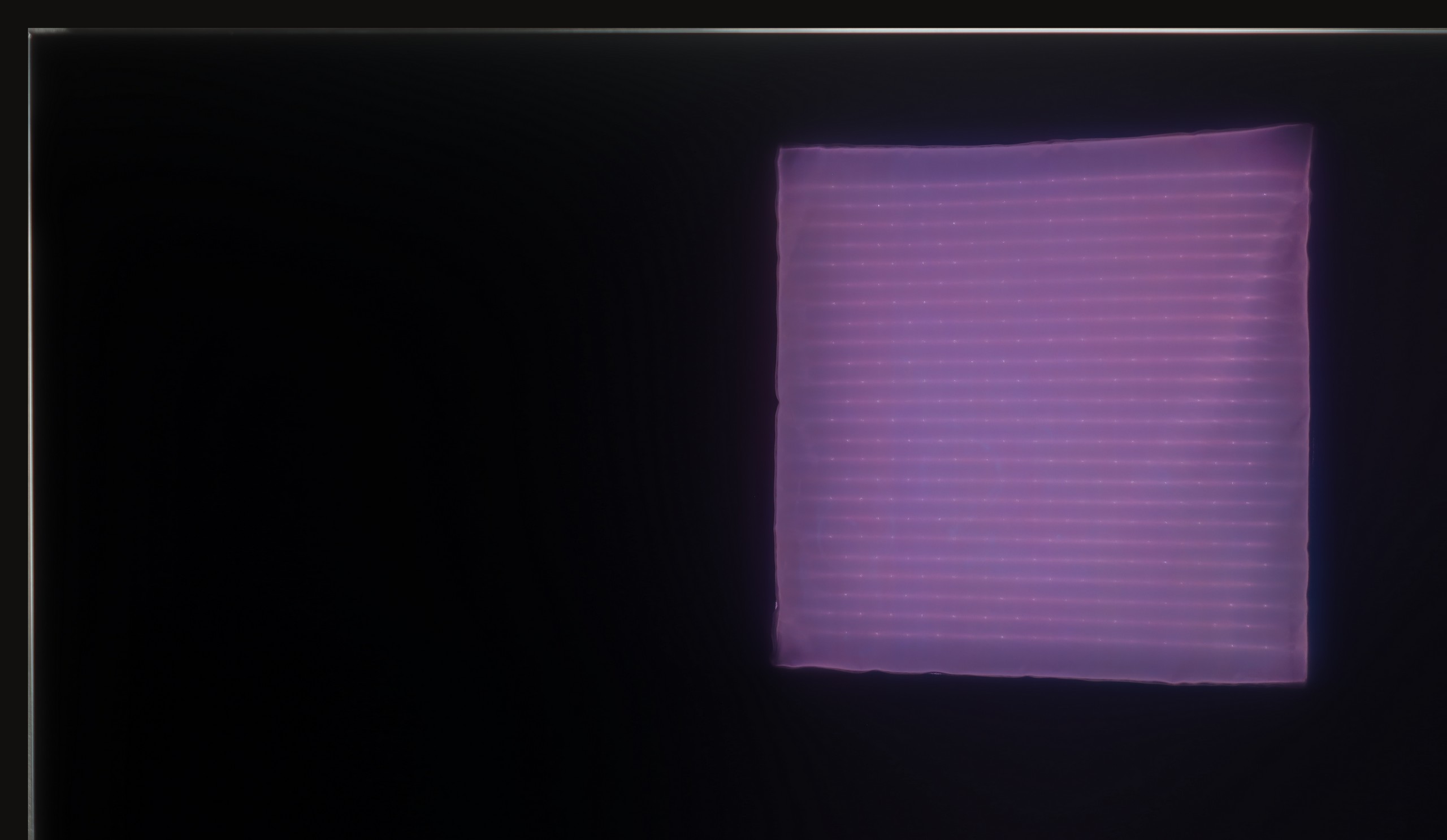
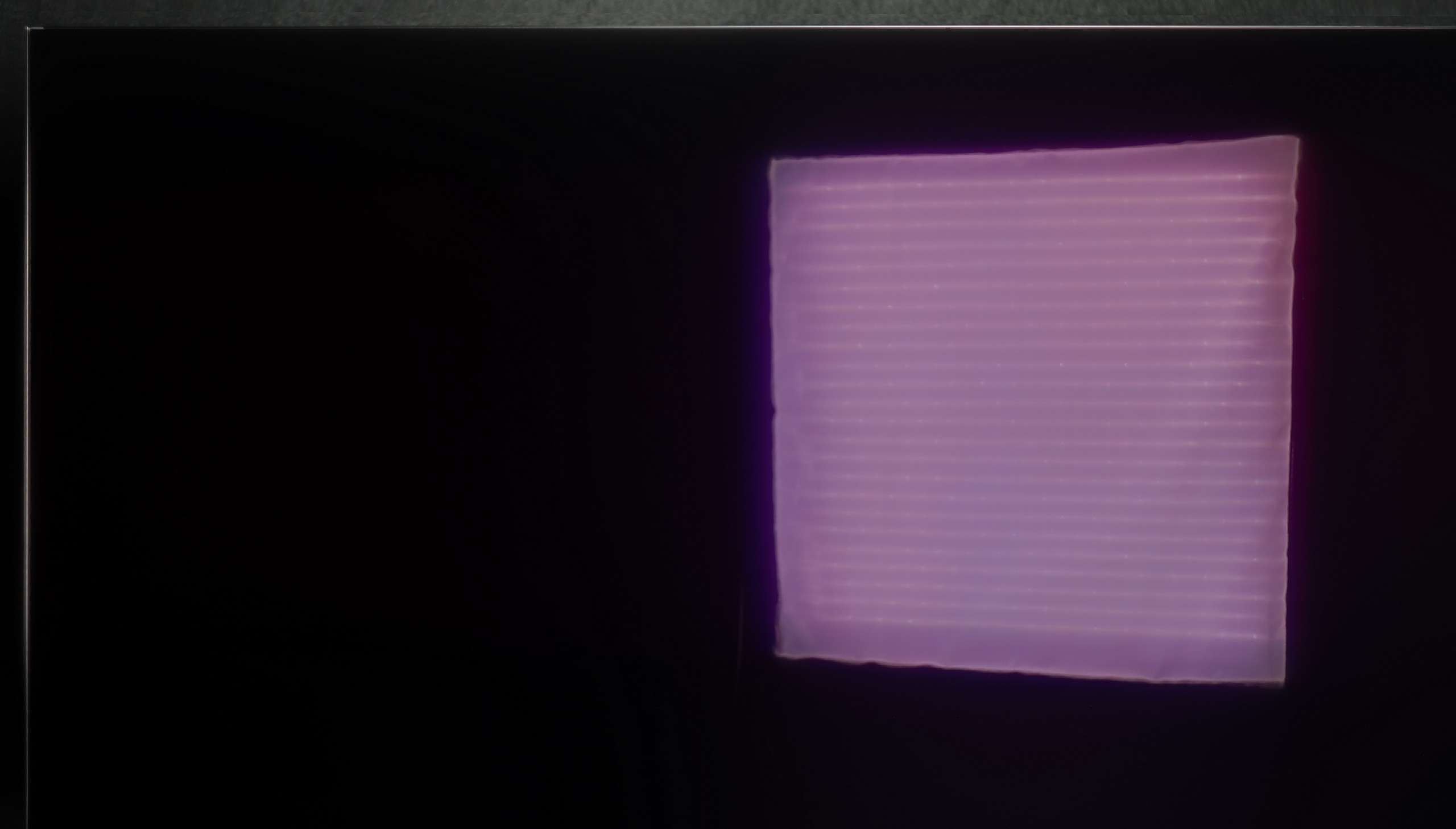


Panel brightness
Average luminance SDR
LG OLED C5: 435 cd/m2
LG OLED G5: 810 cd/m2
The LG G5, thanks to its very high brightness, performs excellently in bright rooms. Even with SDR content, the average brightness value is around 800 nits, which is significantly more than in standard televisions. It will handle a bright living room with ease. Although the panel averages moderate reflection suppression, it still maintains significantly better blacks and colours during the day than QD-OLED panels or those with a matte finish. The G5 will perform well in very sunny rooms – unless you truly cannot stand reflections on the screen. In that case, you will need to use blinds or consider purchasing a television with a matte panel.
LG C5 is one of the brighter OLED televisions on the market, so it should perform well in moderately bright rooms without major issues. The average brightness in SDR mode is around 450 nits – a value sufficient to keep the image readable even during the day. Importantly, the black does not lose depth and does not become "grey", which can still be an issue with QD-OLED panels.
A greater challenge, however, may be reflections. The WOLED panel used in the LG C5 has a glossy coating typical of this technology, which only partially diffuses reflections. In a well-lit living room with large windows, you can see your reflection on the screen – slightly muted, but still visible. In a very sunny room, it may turn out that curtains or blinds will be necessary to fully enjoy the great picture quality.
Panel details
Subpixel Structure:
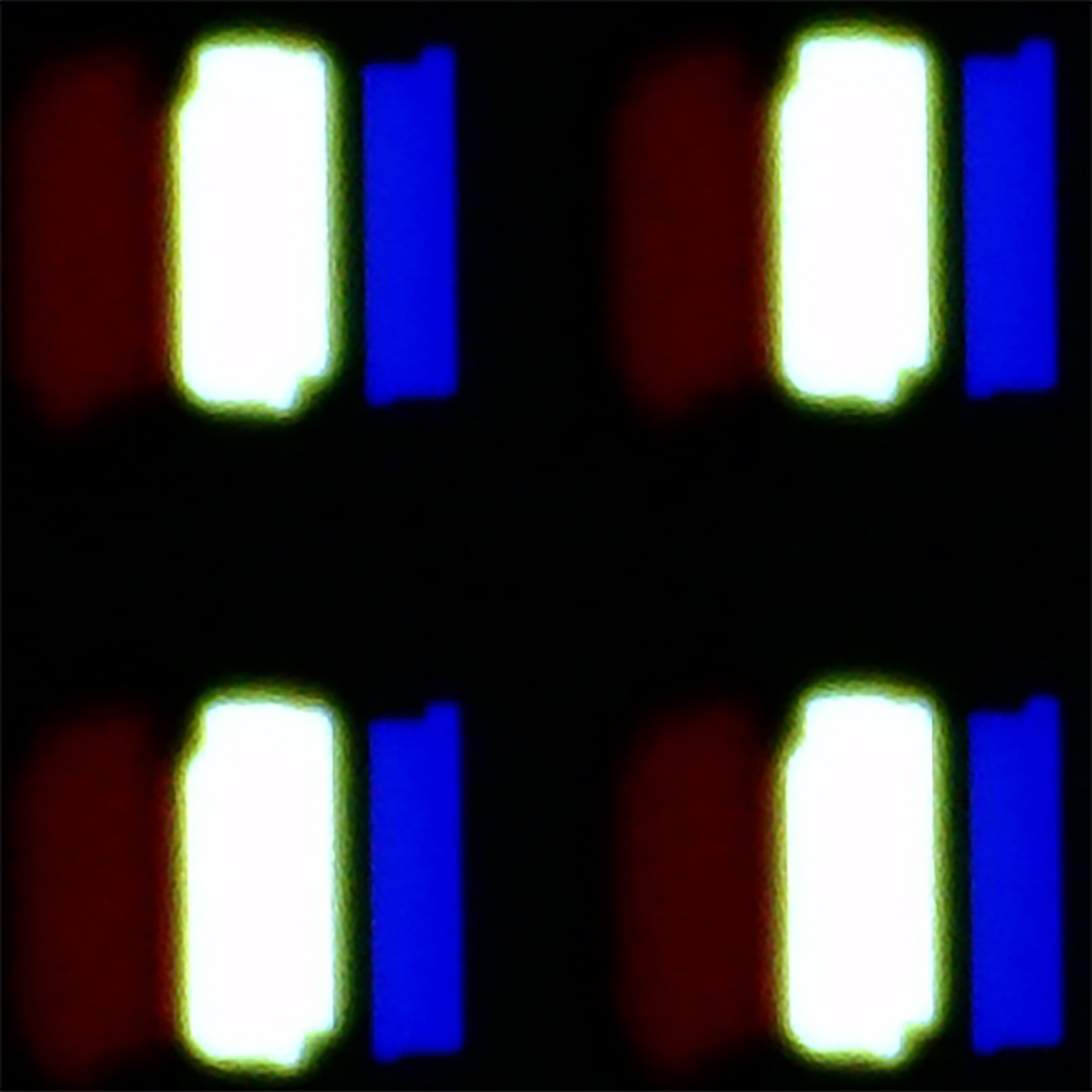
Panel uniformity and thermal imaging:


TV features
8.5/10
7.9/10
- HDMI inputs0 x HDMI 2.0, 4 x HDMI 2.1 48Gbps0 x HDMI 2.0, 4 x HDMI 2.1 48Gbps
- Other inputsIR (remote)IR (remote)
- OutputsToslink (Optical audio), eARC (HDMI), ARC (HDMI)Toslink (Optical audio), eARC (HDMI), ARC (HDMI)
- Network InterfacesWi-Fi 2.4GHz, Wi-Fi 5GHz, Ethernet (LAN) 100MbpsWi-Fi 2.4GHz, Wi-Fi 5GHz, Ethernet (LAN) 100Mbps
- TV receptionDVB-T, DVB-T2, DVB-S, DVB-S2, DVB-CDVB-T, DVB-T2, DVB-S, DVB-S2, DVB-C
Classic features:
- Recording to USB (terrestrial TV)
- Recording programming
- Picture in Picture (PiP)
- RF remote control (no need to aim at the screen)
- Backlit remote control
- Teletext
- Audio only mode
- Bluetooth headphones support
- Simultaneous Bluetooth headphones & TV audio
Smart features:
- AirPlay
- Screen mirroring (Windows Miracast)
- Voice search
- Voice search in native language
- Ability to connect a keyboard and mouse
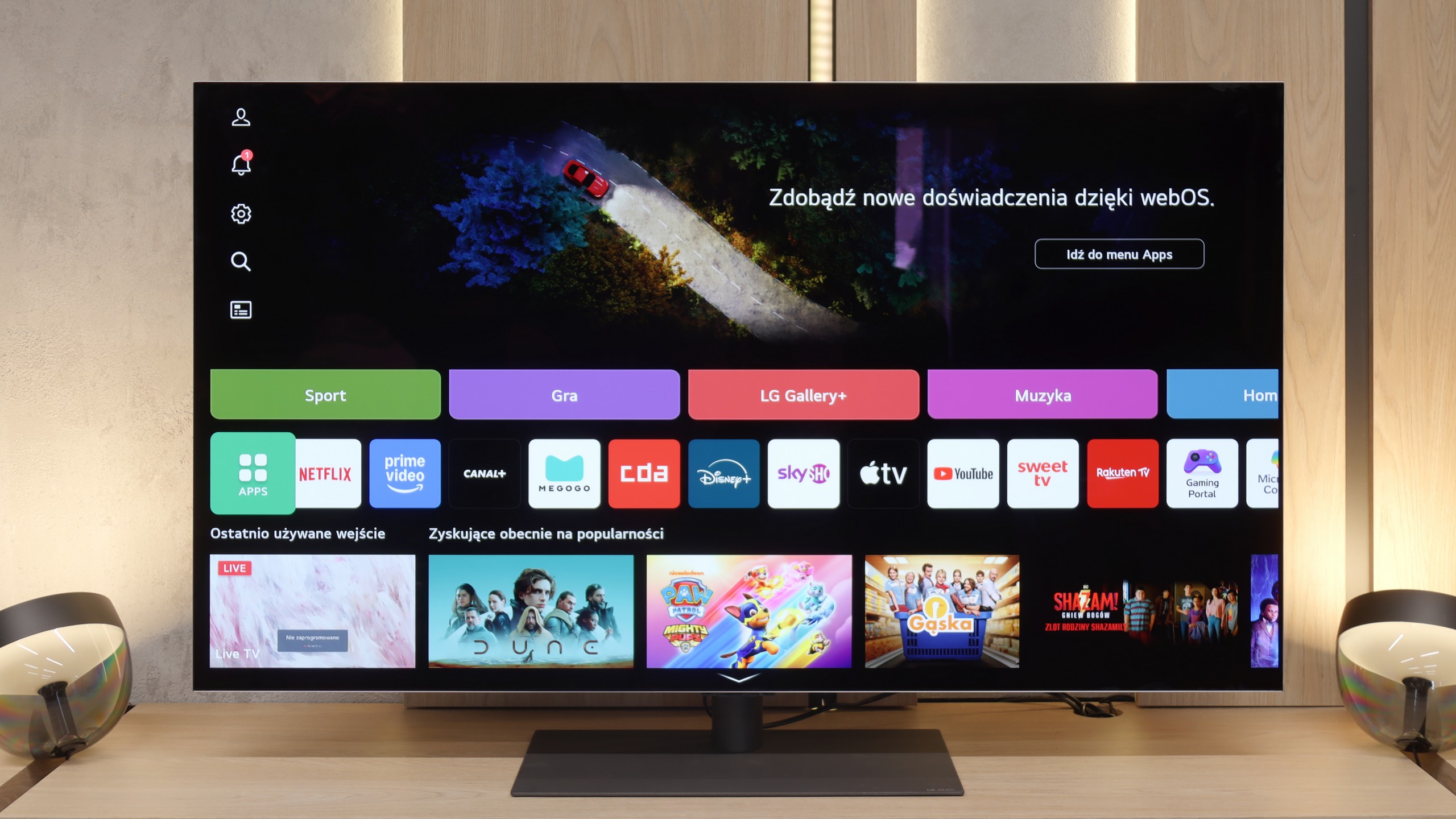
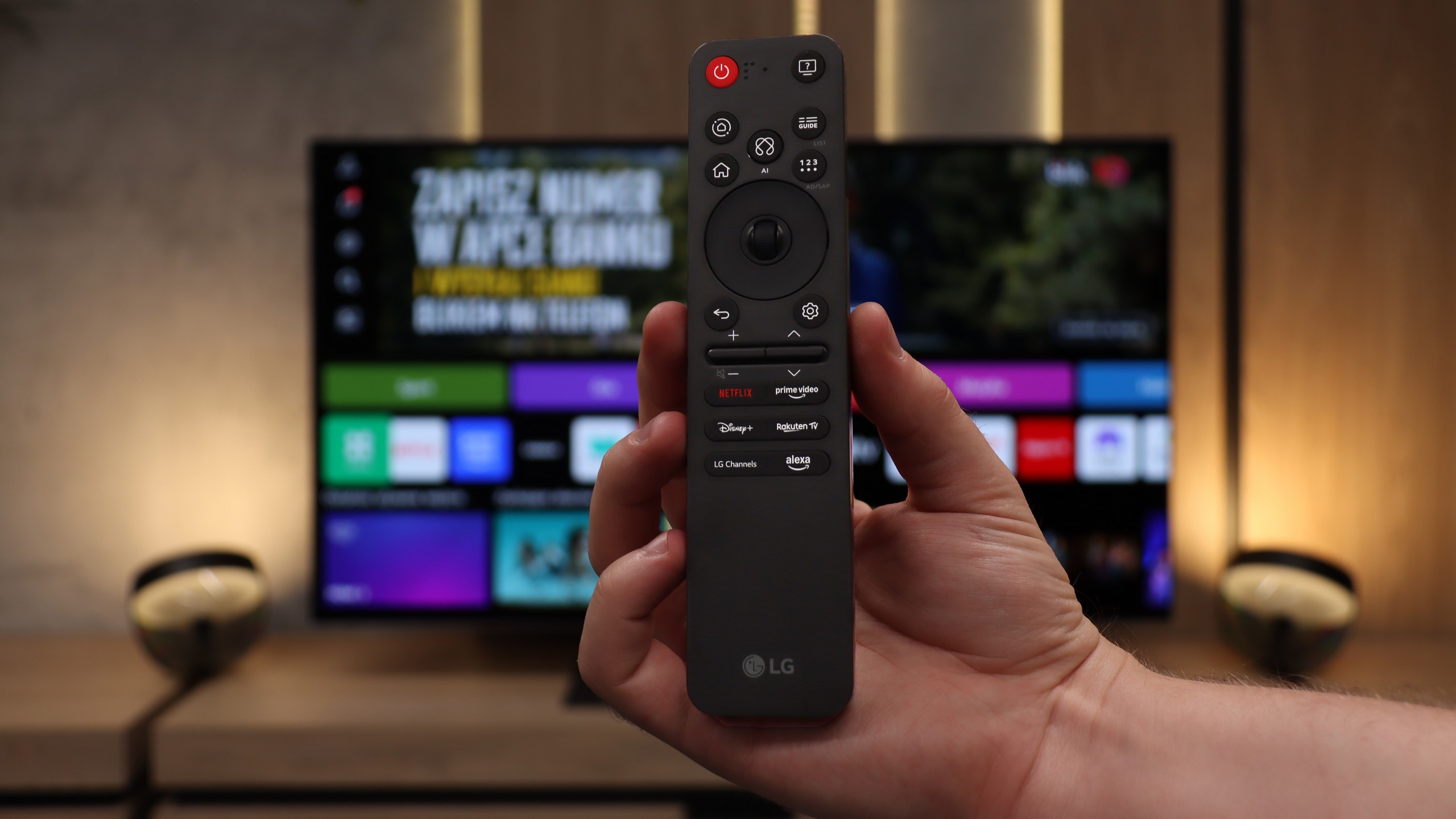
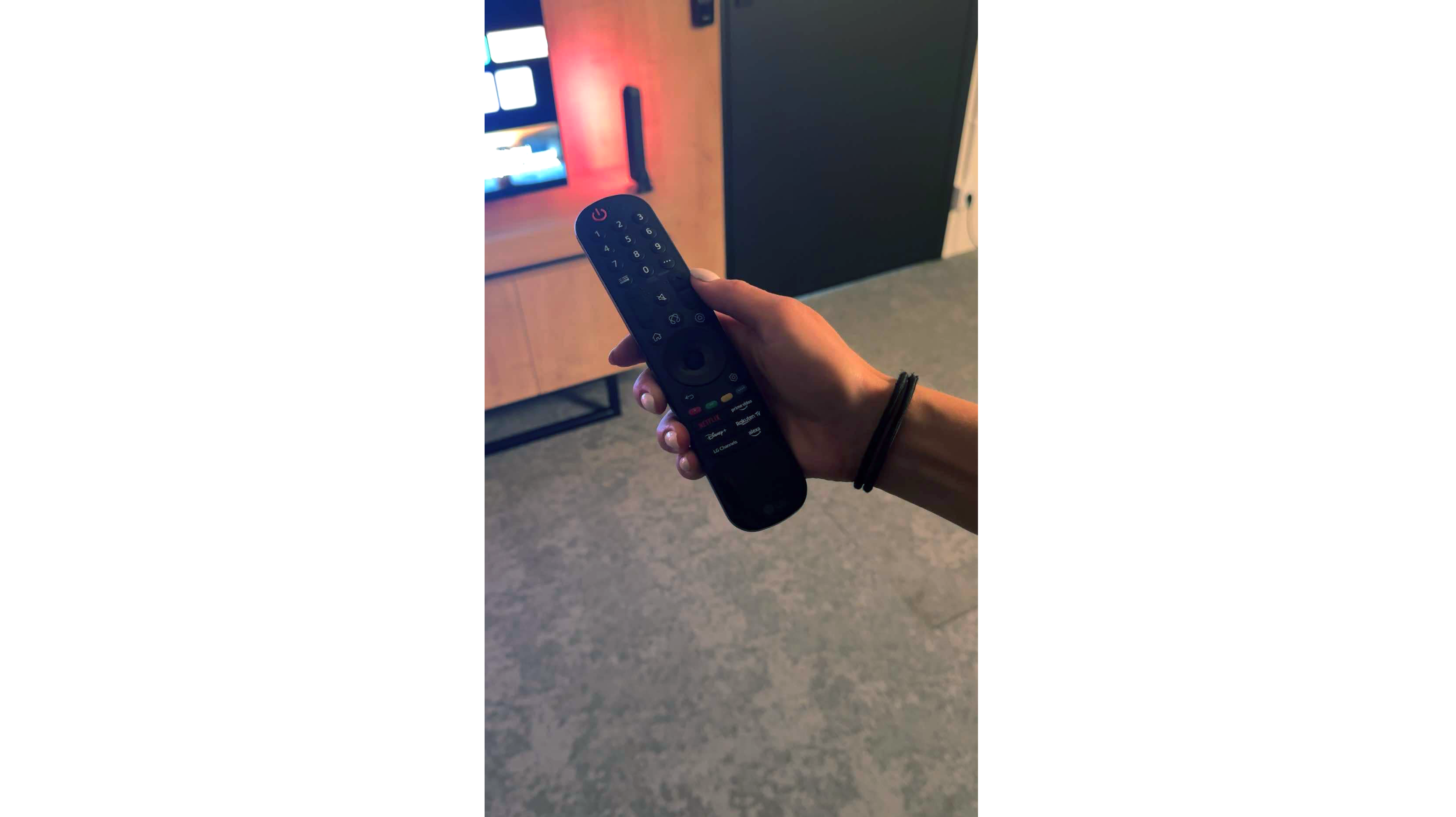
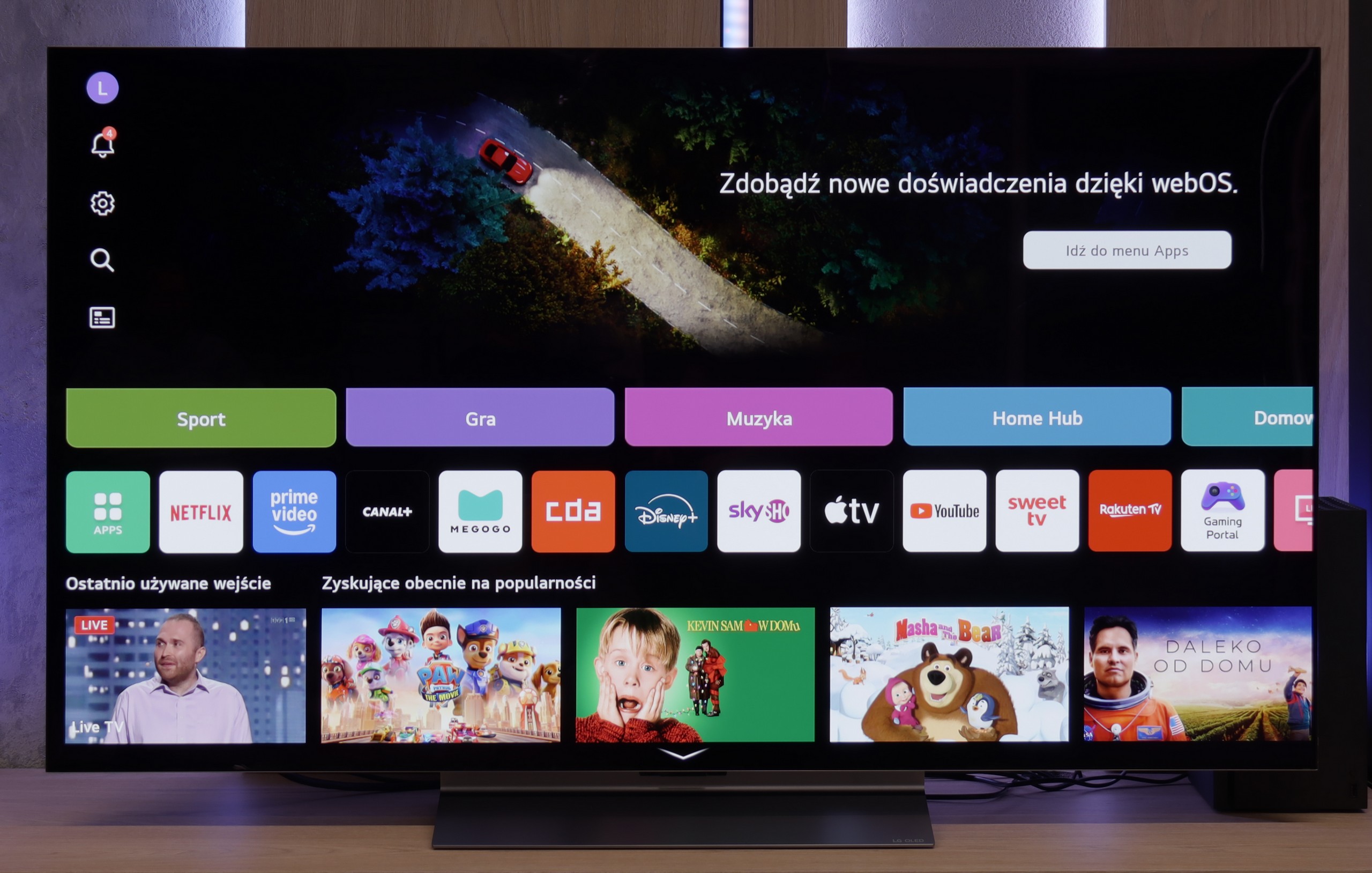
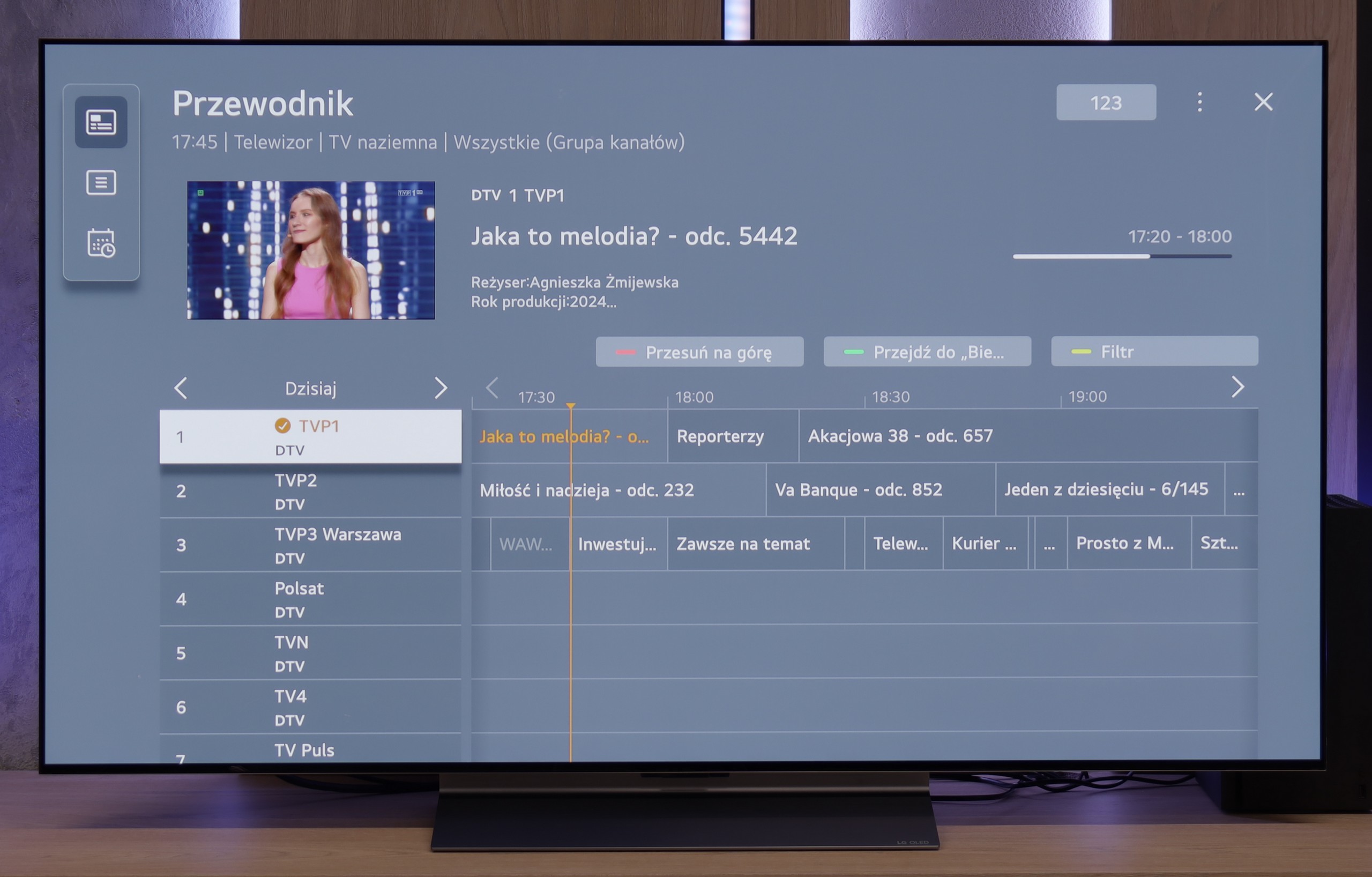
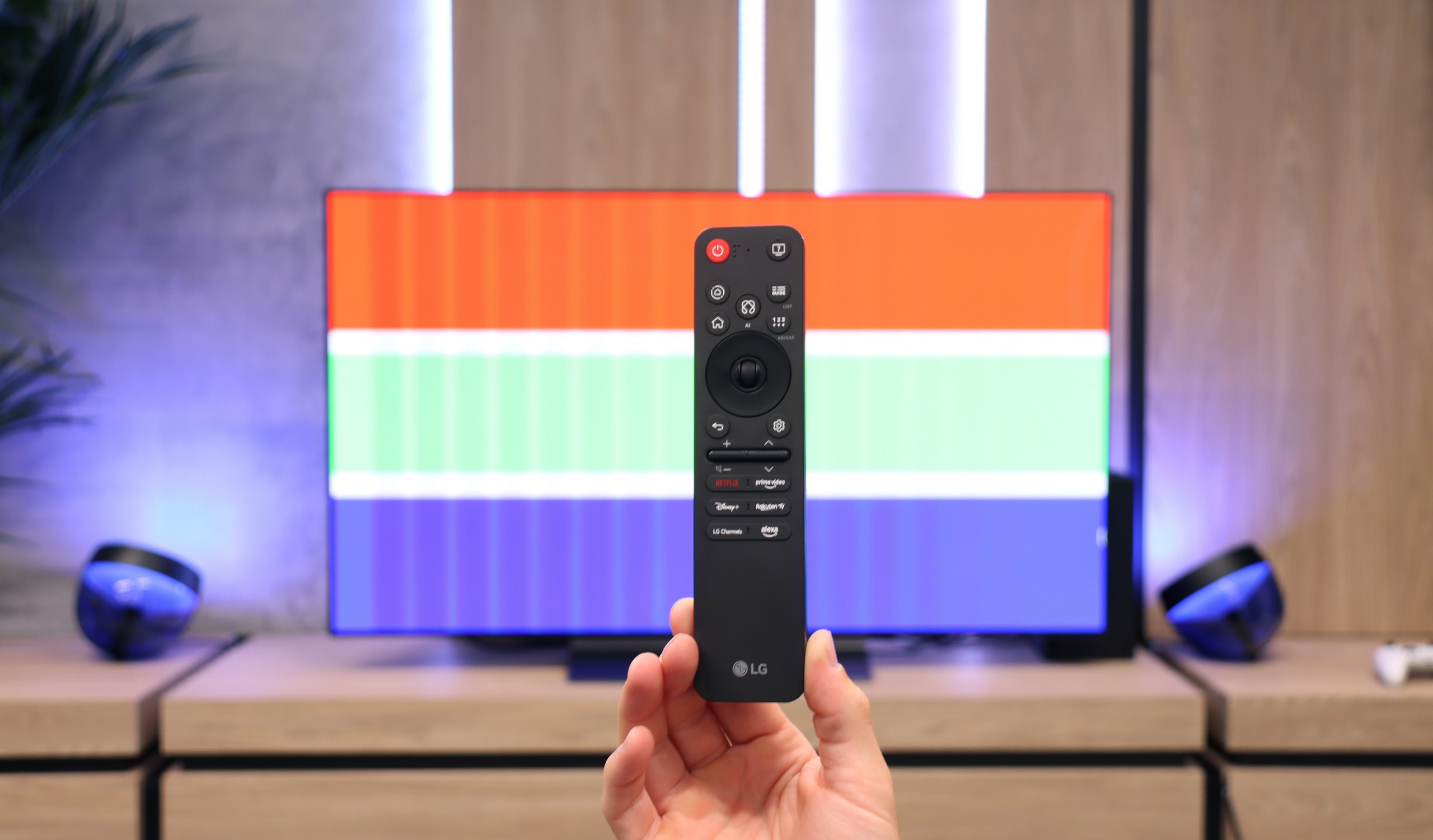
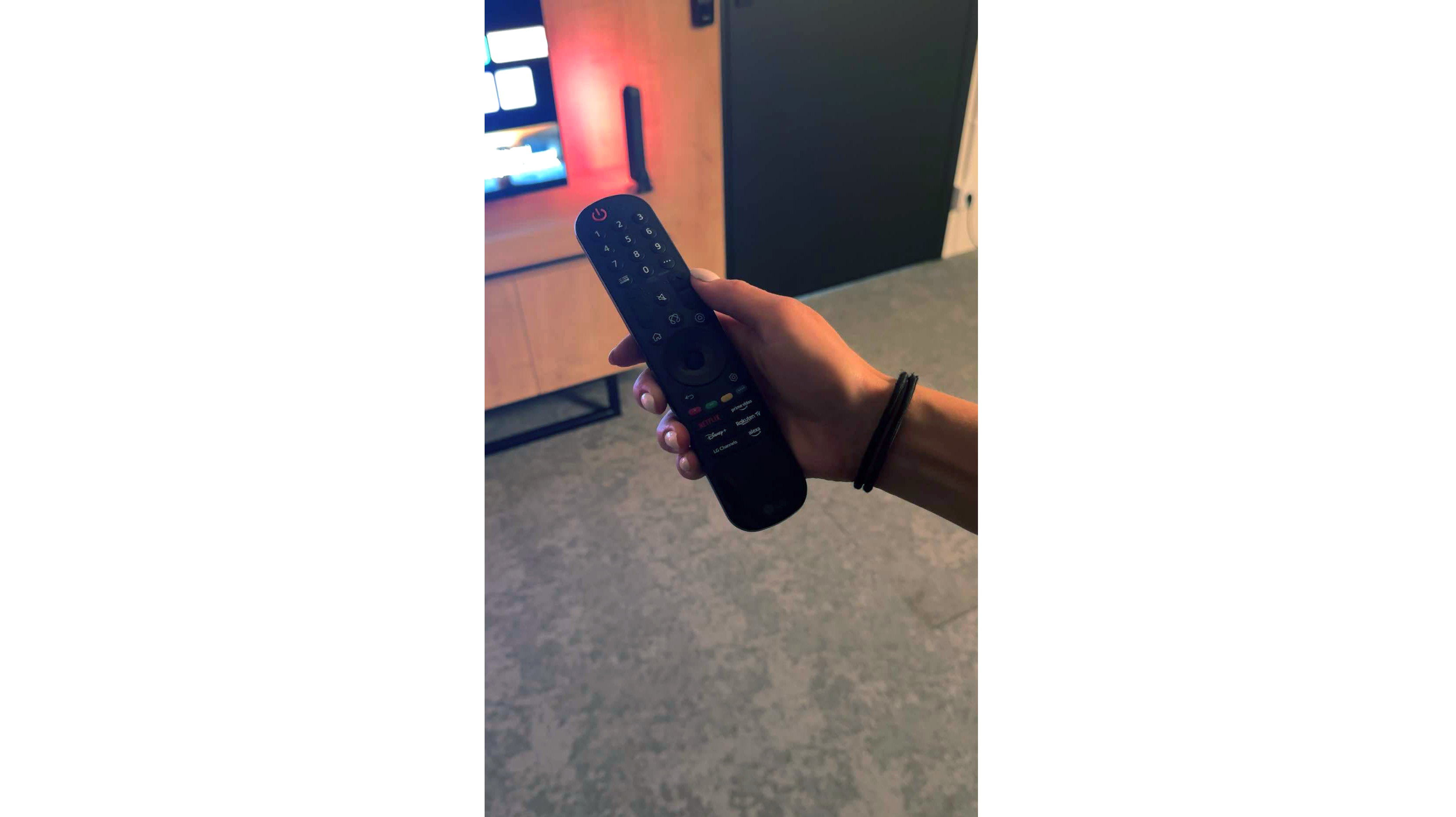
Classic features
LG G5 has a lot to offer when it comes to classic television features. Aside from the inability to watch two sources (PIP), the television handles everyday usage excellently. There are no issues connecting external Bluetooth devices, such as headphones, and the EPG interface is very clear and understandable – even for those who are not particularly tech-savvy.
Smart TV Features
The Smart TV in the G5 operates on the WebOS system – it is the heart and brain of the entire television. With the Magic remote, using the G5 is truly enjoyable. We control the cursor on the screen with wrist movements, which somewhat resembles using a mouse in the air. The system itself is highly developed and offers everything one could expect: AirPlay, screen mirroring, voice search, and voice commands – all of this works smoothly and without delays. Without a doubt, it is one of the best operating systems in televisions on the market.
Note:
During our tests, we had virtually nothing to complain about – perhaps with one exception: the confusion surrounding the remote. Depending on the market and the specific version of the model, you may encounter the new, minimalist Magic remote (without a numeric keypad) or the older version with a full set of buttons. We tested the G54LW model, which came with the new Magic remote, but it's hard to say how the situation looks in other variants. It may be a similar situation to the LG C5 series, where the addition of the remote also depends on the specific market.
Classic TV functions:
In terms of classic television functions, the LG C5 performs really well. Here we have the ability to record programmes to USB from built-in DVB-T(2) tuners, teletext support, an EPG programme list, as well as seamless pairing of headphones via Bluetooth. For many users, these are still very important elements of daily TV use – and here LG doesn’t lack anything except for the PIP function. It is also worth noting the remote control, or rather... the different versions of the remote. In our test, we used the C54 model, which is equipped with the new version of the Magic remote. It resembles Samsung's minimalist approach – there is no numeric keypad or "source" button, but it looks modern and is comfortable for daily use. On the other hand, other variants, such as C5ELB, may be sold with an older version of the remote – a more classic one, with more buttons and a numeric keypad. Some will find it more practical, while others will consider it outdated. In short: quite a bit of confusion, so it's worth checking the model suffix before making a purchase.
Smart TV:
Regardless of the remote's version, we operate the same system – WebOS. This is one of the most enjoyable solutions in the Smart TV world. An intuitive menu, quick operation, and support for popular features such as AirPlay, screen mirroring, and voice assistant make the system perform very well on a daily basis. Additionally, cursor control via the gyroscope in the Magic remote remains one of the most convenient forms of navigation in televisions. There are really many applications available – Netflix, Disney+, HBO Max, Apple TV, and many others. However, it should be noted that this is not a system based on Android/Google TV, so it might happen that we simply won’t find some less popular application in the LG store.
Playing files from USB
9/10
8.8/10
Supported photo formats:
Maximum photo resolution:
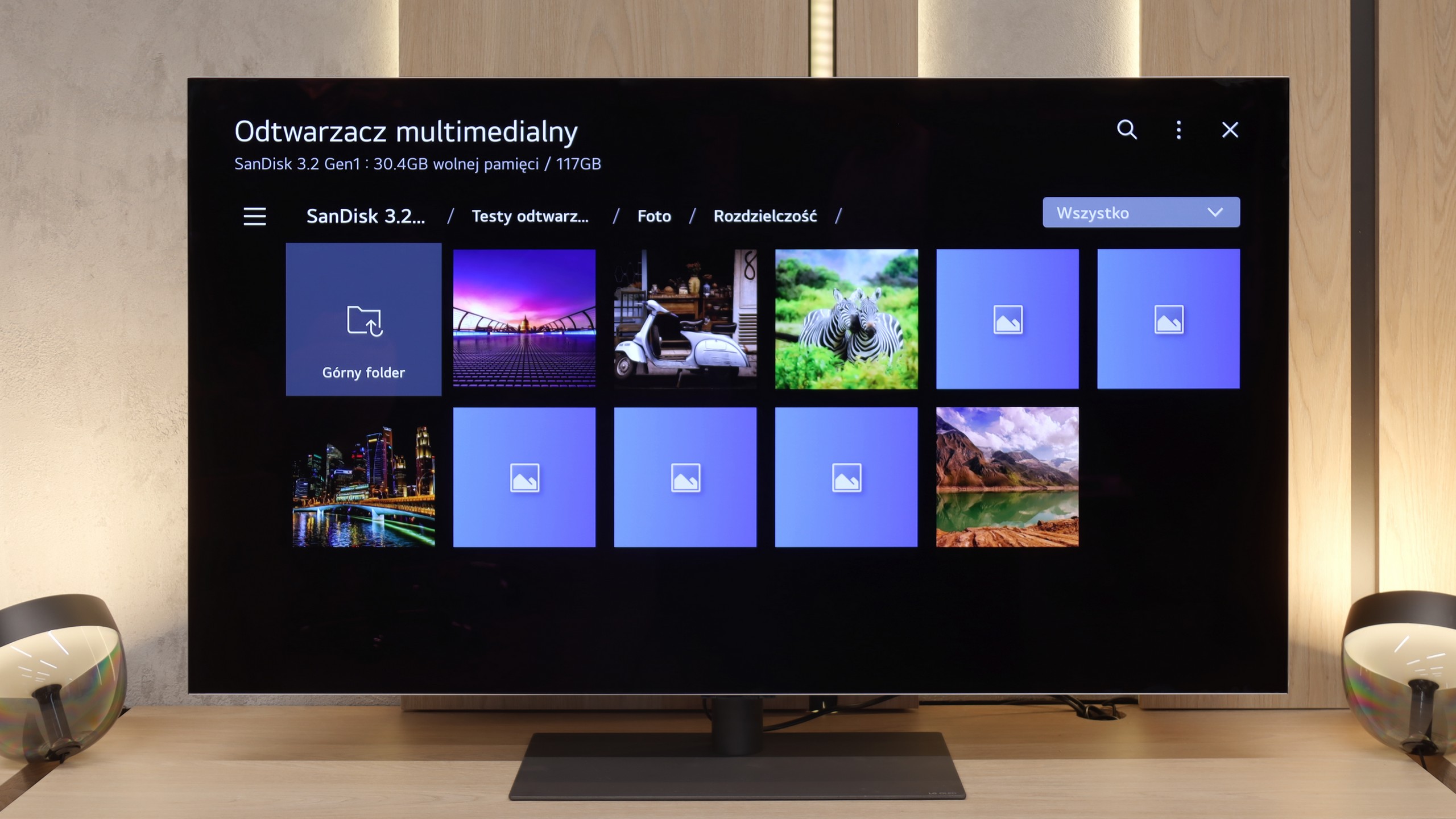
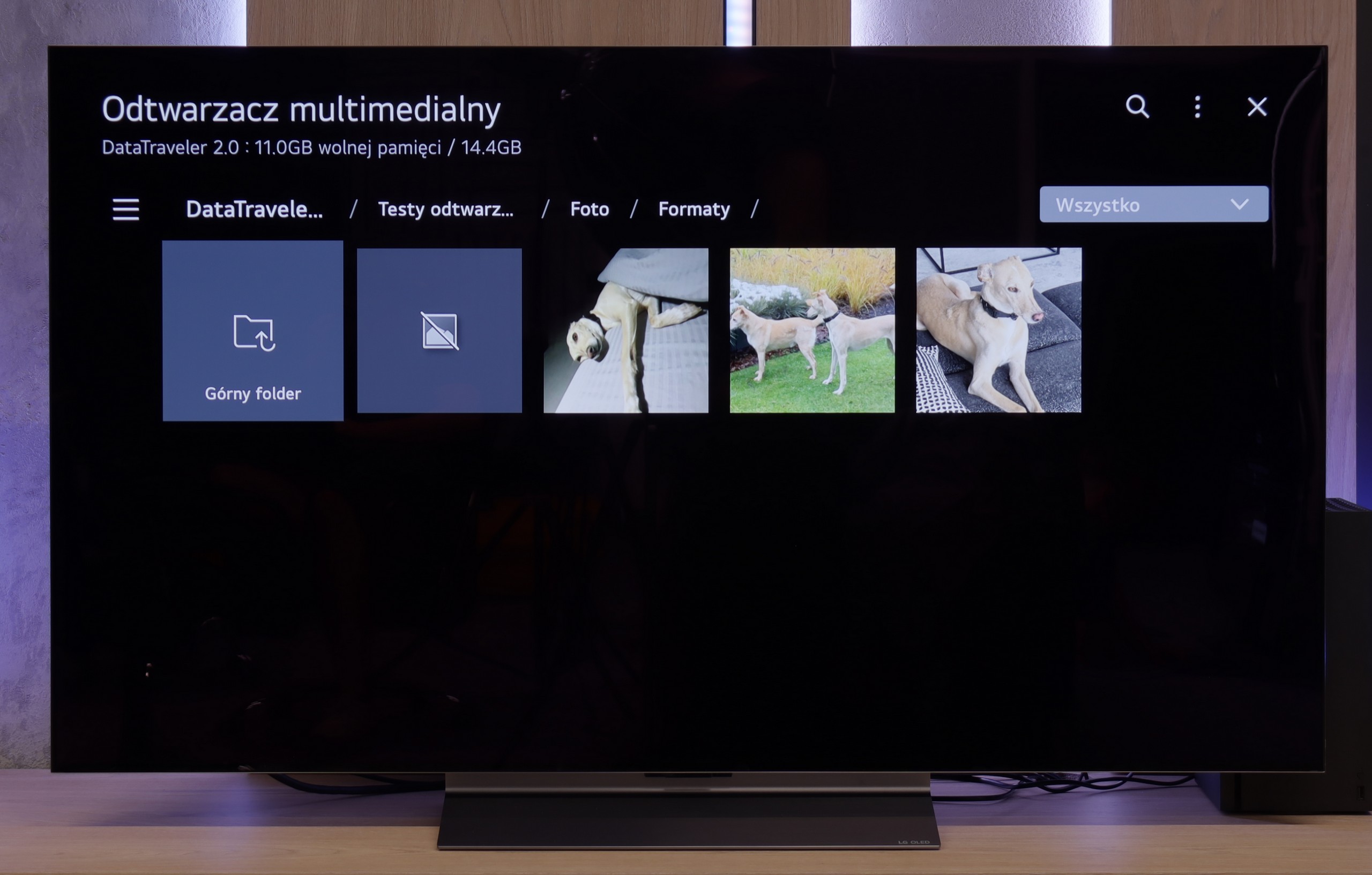
The built-in media player in the LG G5 is really very good. It supports practically everything you might expect from a modern television – most popular formats work without any issues, and the app's performance is swift. Our only disappointment was the lack of support for very high bitrate HEVC 85 Mbit/s files – similar to the C5 and B5 models. Interestingly, the same file played flawlessly on last year's LG OLEDs, so it's hard to say what has caused this change. Nevertheless, in everyday use, the G5 will handle the vast majority of content without the need to connect any external devices for media playback.
The LG C5 is equipped with quite a decent built-in media player, which should meet the expectations of most users. It supports popular video and audio formats, handles subtitles in SRT format, and opens most graphic files without major issues.
The interface itself is fairly simple and intuitive – it doesn't surprise, but it also doesn't cause difficulties in daily use. Of course, it's not on the level of external players or applications from Google TV, but for basic playback of films from a pen drive or hard drive – it is more than adequate.
Apps
9.1/10
9.1/10














































Sound
8.7/10
7.2/10
- Maximum volume84dB84dB
- Dolby Digital Plus 7.1
- Dolby True HD 7.1
- Dolby Atmos in Dolby Digital Plus (JOC)
- Dolby Atmos in Dolby True HD
- DTS:X in DTS-HD MA
- DTS-HD Master Audio
The sound on the LG G5, considering its slim profile, is truly phenomenal. When listening to music, one can feel a light, pleasant bass, and in films, the dialogue is clear and audible – it does not get lost even in dynamic scenes. Unfortunately, a certain disappointment is the lack of support for the DTS format, which LG used in its older models. It’s a shame, as many home cinema enthusiasts may feel this as a step backwards.
For such a slim television, the LG C5 surprises with quite good sound quality. Within its thin casing, a set of specific speakers has been incorporated, which produce clear sound, with well audible details and – surprisingly – a light yet noticeable bass. It is more than sufficient for everyday viewing, and in many cases, it might even offer a pleasant surprise. It is a pity that this year LG decided to completely eliminate support for DTS codecs. For most people, this will not be a problem, but if someone uses Blu-ray discs and enjoys this format – especially in its more advanced versions – they may feel its absence. In such a case, an external amplifier or soundbar with appropriate audio support remains the option.
Sound Quality Test
Acoustic Measurements
84dBC (Max)
75dBC
84dBC (Max)
75dBC
